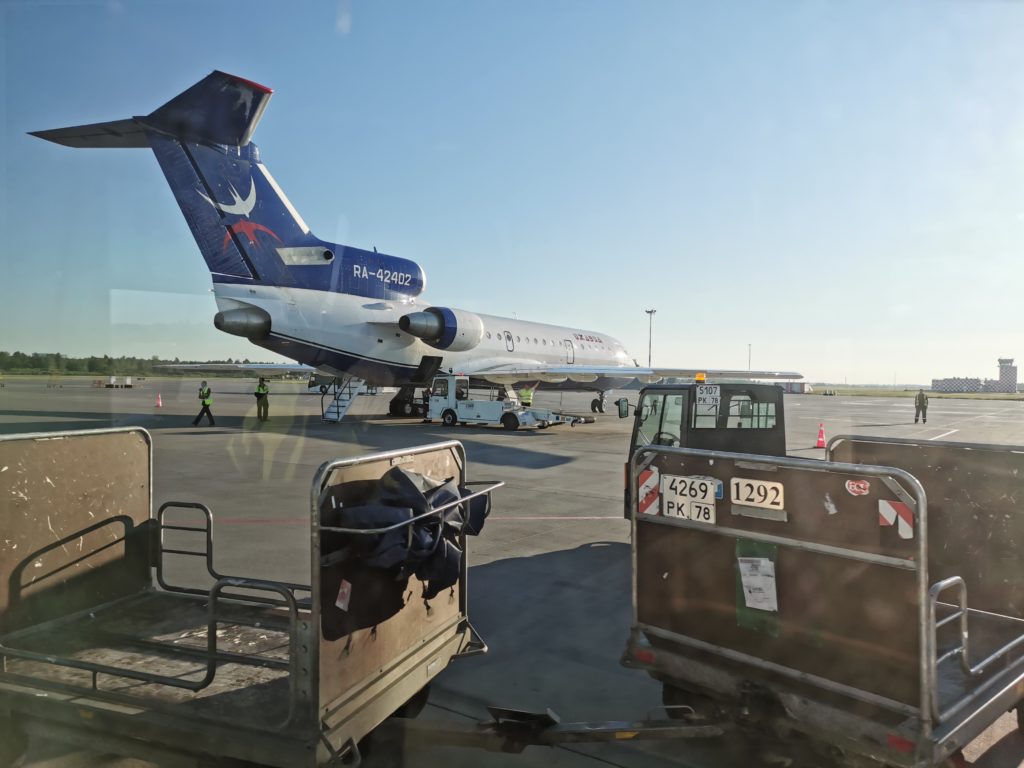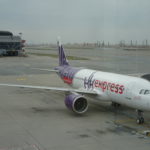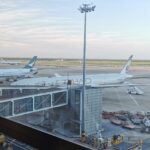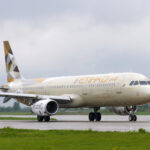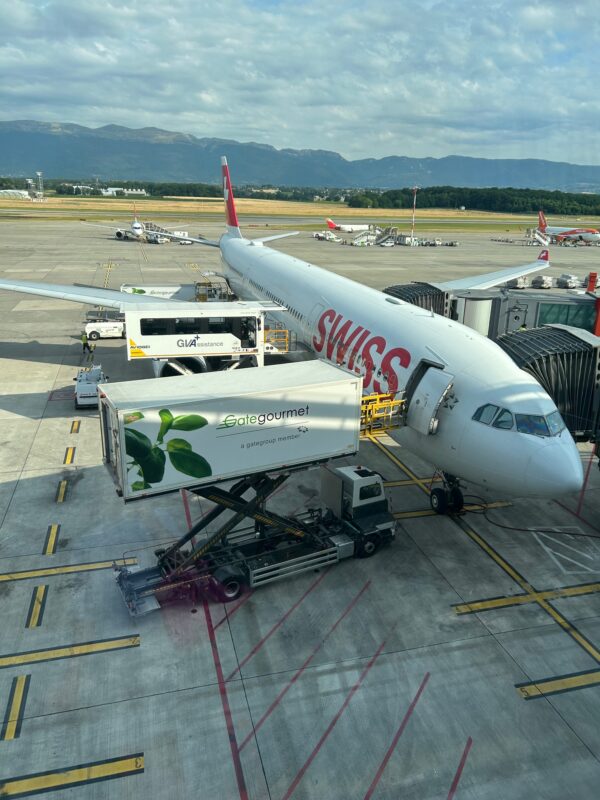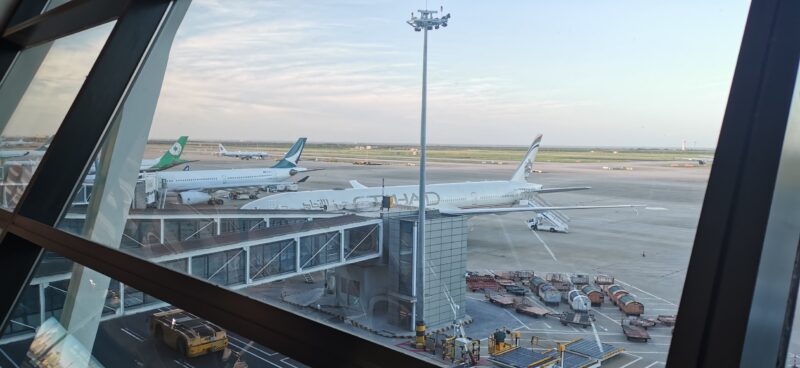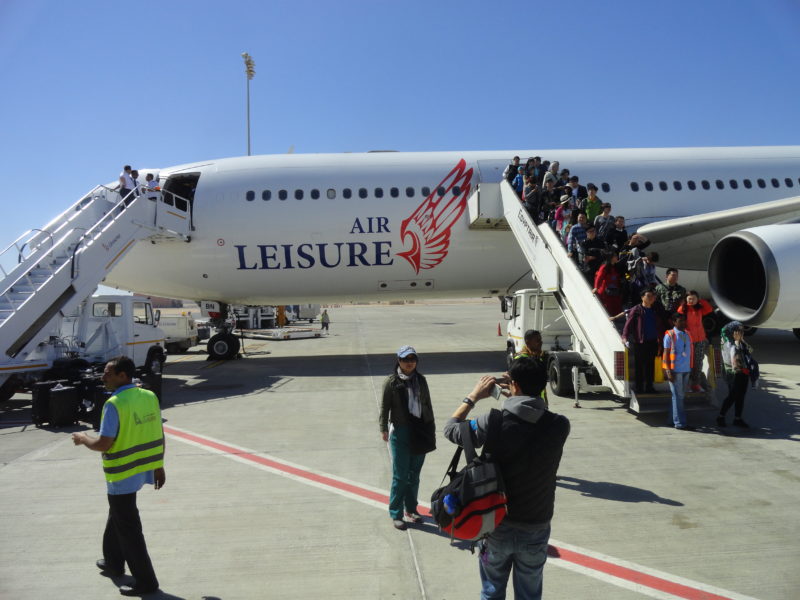Trip Report: A Visa-free Yakovlev
In early 2019, I began planning how I would finally fly on a Yakovlev Yak-42. I had previously flown on its smaller sibling, the Yak-40, with Ukranian airline Motor Sich while on an aviation tour in Belarus and as a big trijet fan, naturally I wanted to experience the newer and larger Yak.
Izhavia, a Russian carrier based in Izhevsk, was well known in the avgeek community for its fleet of Yak-42s which had soldiered on well past those of most other operators. At the time, Izhavia’s fleet consisted only of the big Yaks, so there was no chance of an equipment swap to something less interesting. With Izhevsk operating flights to both Moscow and St. Petersburg from its Izhevsk hub, it seemed it would be easy to make a daytrip out of it.
Waffling on a Visa
I found affordable flights from the UK to Russia on Pobeda, but while in the planning stage I could again feel looming over me what had caused me to put off this trip so many times before – the Russian visa application. Many say that it’s not such a hard visa compared to those of some other countries, but as I navigated the application website I could feel my enthusiasm for the trip waning. The tedious form filling was the least of the potential headaches, in my view. Much more troublesome would be needing to visit the visa application centre in London to deposit and collect my passport, while finding a travel insurance policy that matched the requirements, getting an invitation letter, and paying the visa fee itself easily doubled the cost of what otherwise could be a very affordable trip.
Taking a break from looking through the visa requirements, I thought to myself whether I could manage to fit this trip within the 72-hour visa free window that ferry passengers are allowed when arriving in Russia. I had known about the Moby St. Peter Line service to St. Petersburg for a few years and thought that in addition to saving the cost and trouble of the visa, it would be an interesting bonus to travel internationally by ship, which I had rarely done.
The Visa-free Option
Of course, the visa free programme for ferry and cruise passengers in St. Petersburg is intended to allow off-ship excursions within that city rather than travelling the rest of the country. In fact the letter of the law states that such passengers should be staying on the ship overnight and only participating in organised tours. Somehow the Moby service gets away with expanding this definition a bit by allowing its passengers to stay in designated hotels in St. Petersburg booked through their website and the organised tour consists only of a paid shuttle journey from the port to the city centre. Despite this, I figured I ought to be able to make my Yak trip to Izhevsk and back within this 72-hour window.
I booked a June departure on the ferry from Helsinki to St. Petersburg with a return to Tallinn two days later. At the same time, I reserved my approved accommodation in St. Petersburg at the cheapest hotel on offer which, at 30 EUR per night, was still priced higher than booking through other channels, though I didn’t have a choice there. Finally, I added in the 25 EUR shuttle “tour” to and from the city so I would be able to avail of the visa-free facility.
In the time leading up to the trip, I monitored the Izhavia schedule from LED to IJK and IJK to DME as I planned to essentially connect in Izhevsk between St. Petersburg and Moscow, then fill in the leg from DME back to LED with whichever airline had a fitting schedule. I didn’t book anything as I knew Izhavia’s schedule (and schedules of Russian domestic flights generally) tended to change frequently.
Reading too much
I made the mistake of reading some trip reports of other avgeeks who had traveled to Russia for aircraft type chasing, some details of which worried me. One mentioned the constantly changing gates for his flight at Vnukovo Airport with announcements only in Russian and with no chance of finding his departure gate were it not for a helpful Russian couple. Another mentioned having his documents scrutinized by an official at Sochi Airport and being released from the official’s office upon payment of a bribe equivalent to the value of a bottle of whiskey. I knew if anyone outside of St. Petersburg gave my documents any level of scrutiny, I would be in trouble – having not even a visa!
I turned to a Facebook group where members share travel advice and asked about the possibility of traveling outside St. Petersburg during the 72-hour visa free window and whether any document checks were in place for domestic flights. While I received responses that visas don’t get checked on domestic flights and trains, one member replied, “It is illegal. You will be caught. Do not try this….Russia is a country where no one attempts illegal immigration…[you] will be arrested, definitely put in jail and deported.” That made me consider getting a visa.
However, once I went back to the visa application site, I was again overwhelmed by the tremendous feeling of not wanting to bother with it, so I decided to wait and think about it. In the meantime, I booked a British Airways flight to Helsinki using Avios, so as to give myself a little more flexibility if I decided to scrap the trip.
Taking my chances
Weeks went by and the trip was quickly approaching, yet I still had not bothered with a visa. Putting the doomsday scenario presented in the Facebook group out of my mind, I decided to try my luck. At this point, I finally booked my Yak flight. The Izhavia schedule from St. Petersburg had changed, unsurprisingly, and was now an evening departure arriving in Izhevsk at midnight. With such a late arrival, I was a bit anxious that I would need to spend a long time in the Izhevsk Airport as I wouldn’t be welcome in any hotels without a Russian visa.
I was pleasantly surprised to find that Aeroflot had an incredibly early 3:15am departure to Moscow Sheremetyevo, meaning I could have a comfortable three-hour layover in Izhevsk. The Aeroflot flight to Moscow and connecting flight to St. Petersburg were both to be operated by the Sukhoi Superjet. While I had flown on this type previously with Interjet in Mexico, it’s still certainly more interesting than another Boeing or Airbus flight.
I booked:
- LED-IJK Departing on my second day in St. Petersburg at 8:30 pm arriving 12:00 midnight for 9200 rubles.
- IJK-SVO Departing at 3:15 am Arriving 4:20 am and SVO-LED Departing at 6:00 am Arriving 7:25 am on the day I was due to board the ship to Tallinn. Total cost: 11479 rubles
-
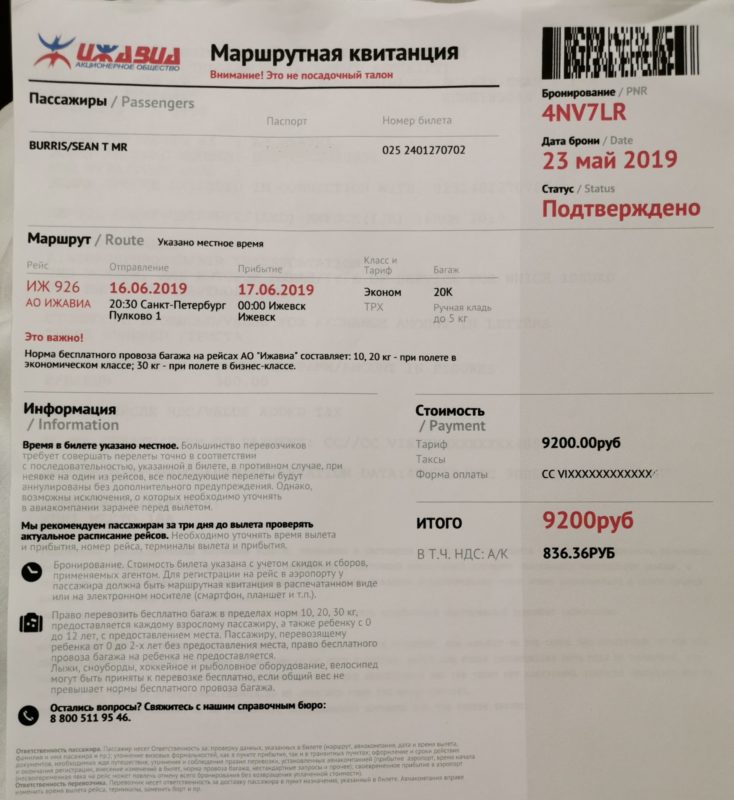
Izhavia itinerary from St. Petersburg to Izhevsk
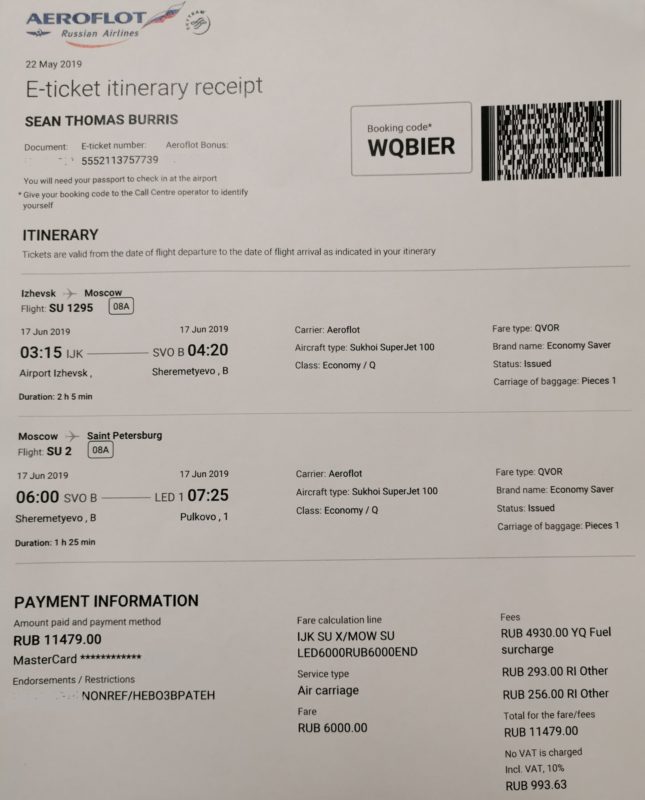
Aeroflot itinerary from Izhevsk to St. Petersburg via Moscow
After an uneventful morning A320 flight from Heathrow, I presented myself for Immigration inspection at Helsinki Vantaa Airport. Asked about my reason for coming to Finland, I said, “I am just transiting to the ferry for St. Petersburg,” and was quickly on my way. Despite flying through and even sleeping at Vantaa Airport in the past, I had never been to the city of Helsinki, so after arriving from the airport by train, I wandered its streets to take in the sights on that cloudy day.
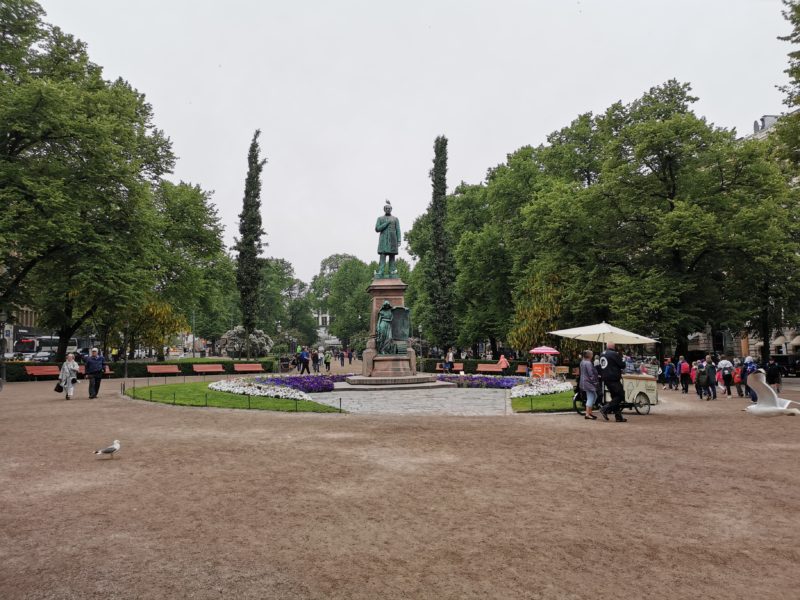
Park in Helsinki
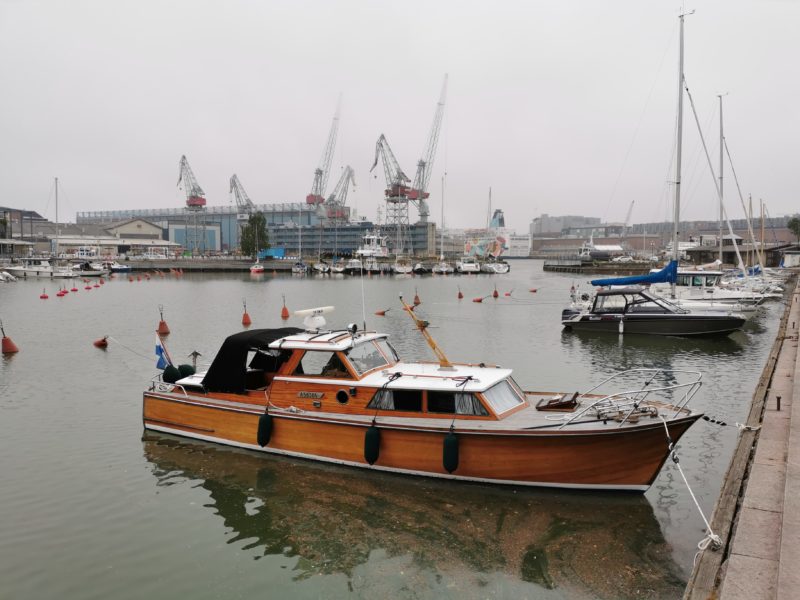
Boats in Helsinki
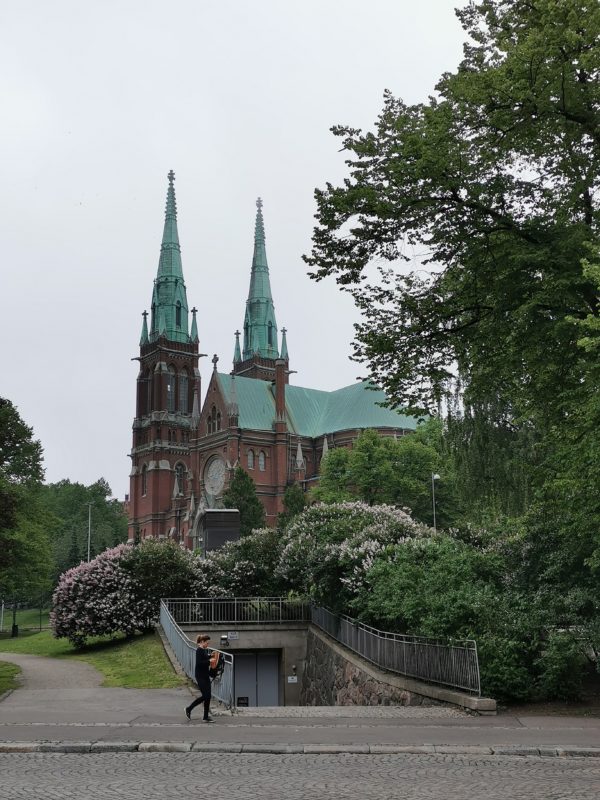
Helsinki sightseeing
After a meal at Burger King, I began to make my way to the port on foot, finally catching a glimpse of my ride to Russia on the way. Lines for ferry check in at the terminal were not too long and after presenting my passport and reservation details, I soon had my boarding card which also served as the key to my stateroom onboard.
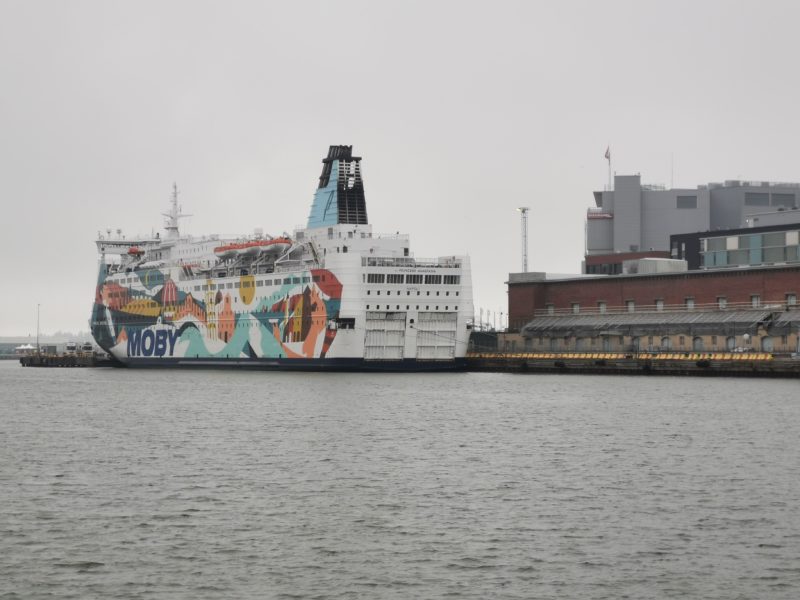
First glimpse of the ferry to St. Petersburg
Slow boat to Russia
I proceeded upstairs to exit Finland and received a Schengen exit stamp with a ship icon for the first time. Onboard, I dropped my belongings in my worn and windowless stateroom and proceeded to explore the ship. While the Princess Anastasia is a large vessel, it lacks the fancy amenities of a cruise liner such as pools and elegant dining rooms, but it does have a casino, club, and plenty of duty free, which I found was especially popular with the Russian passengers returning home.
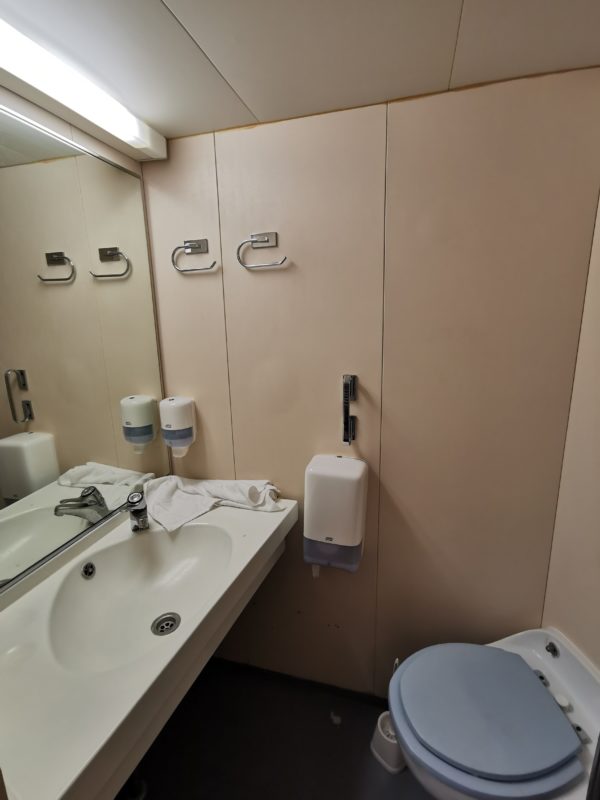
Princess Anastasia stateroom bathroom
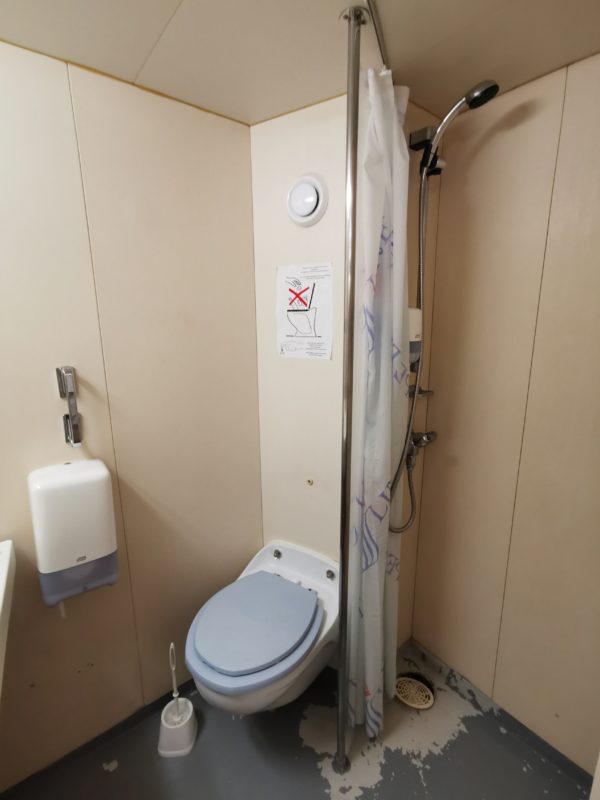
Ferry stateroom bathroom
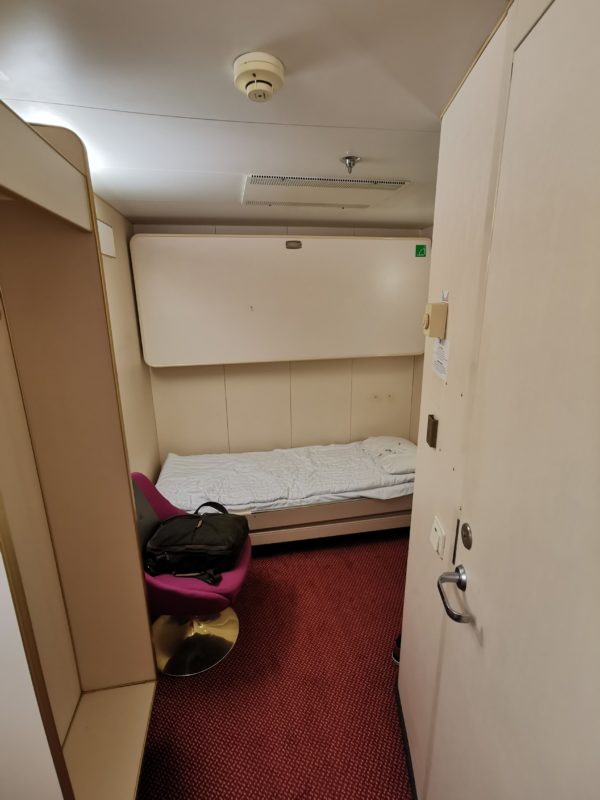
Stateroom on the ferry
Outside on deck, I eagerly awaited our departure then watched the scenery go by as we sailed into the Gulf of Finland. Wi-fi on the ship was expensive, so I completed all my internet-related tasks while still in range of 4G, before switching off and roaming the interior of the ship and reading a book after the sun had set. The stateroom was functional if not beautiful and I cleaned up then tried to sleep early, not being interested in the casino or bar fun that night.
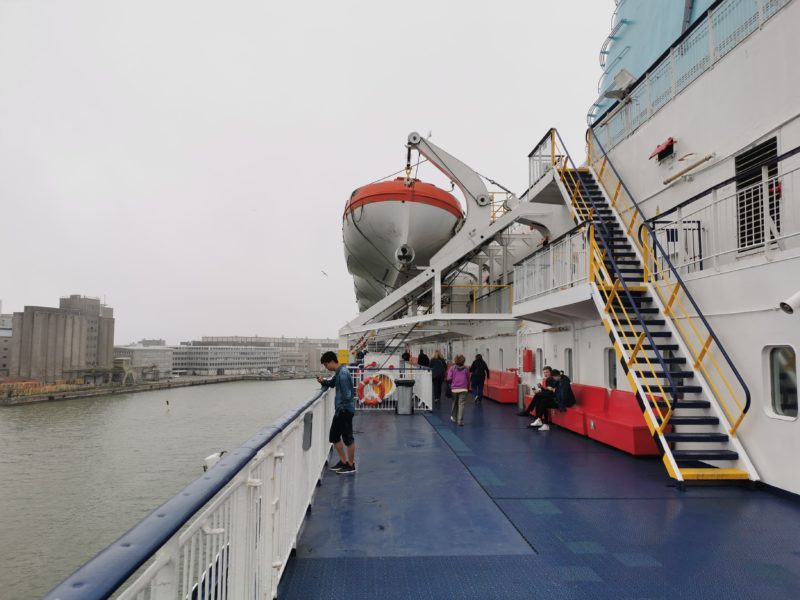
Lifeboats on the Princess Anastasia
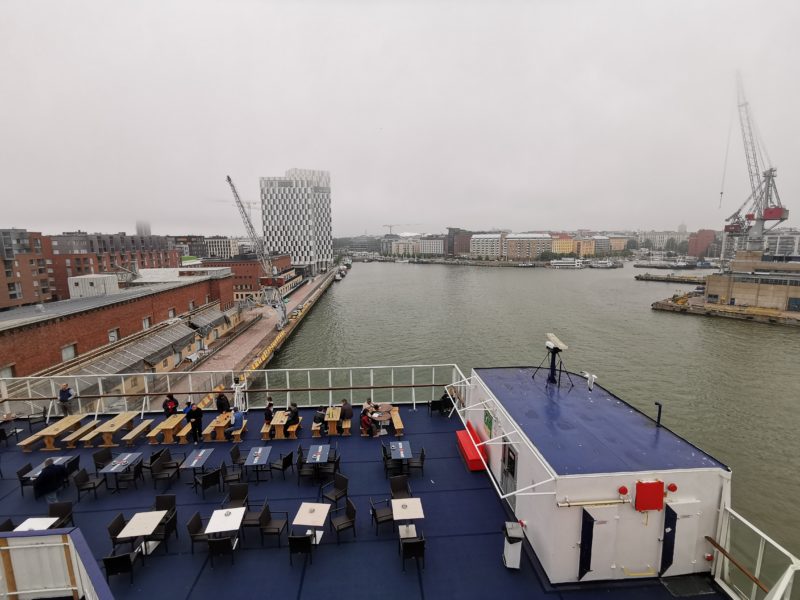
Dining area at the ferry’s stern
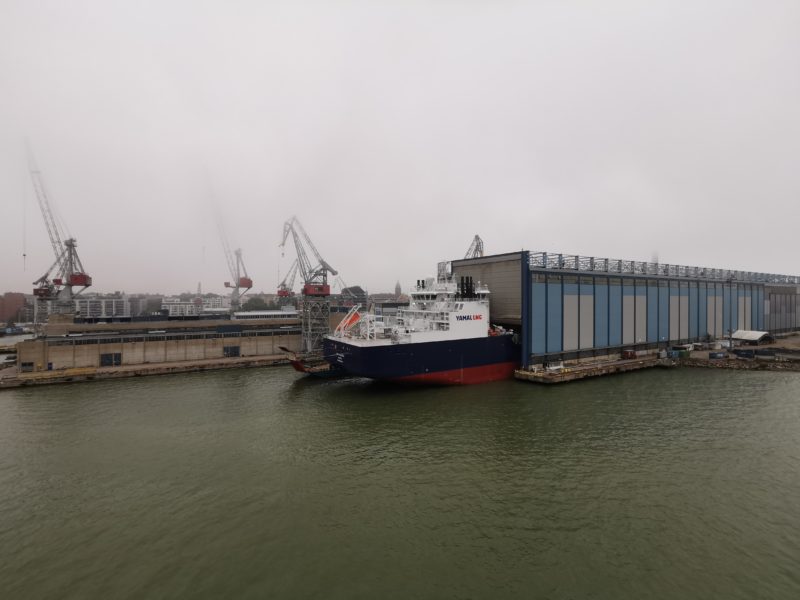
Ship under maintenance in Helsinki
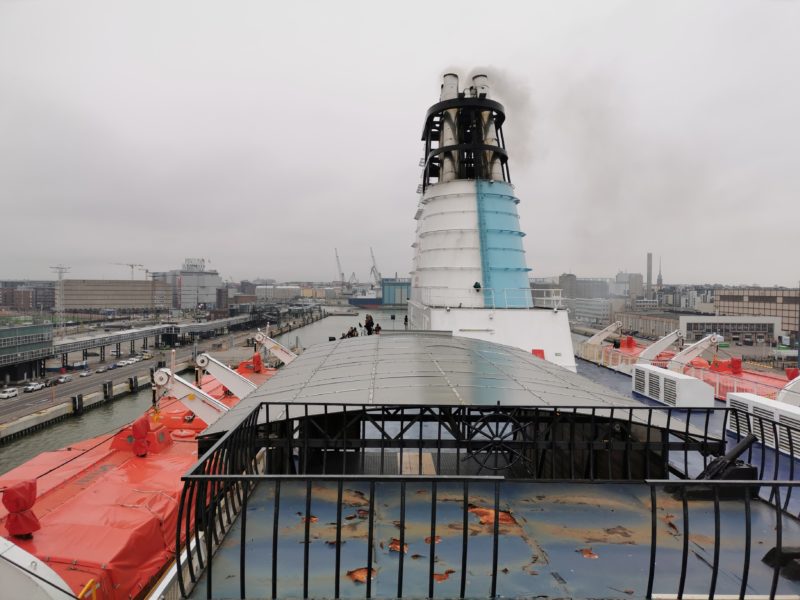
On the upper deck of the ferry
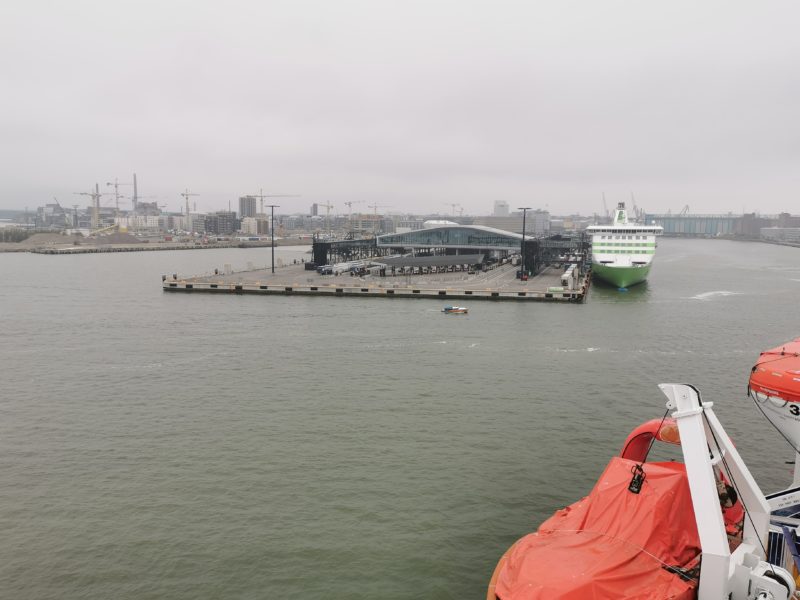
Cruise ship in Helsinki
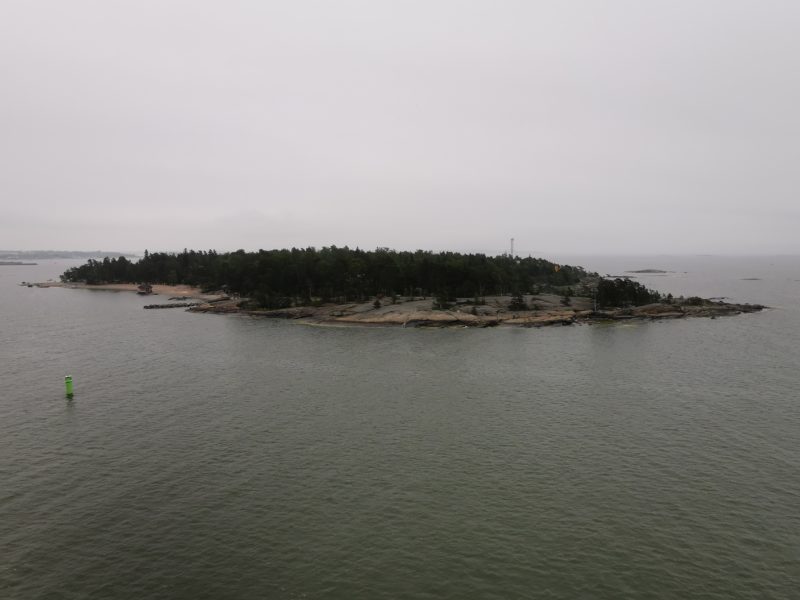
Passing an island near Helsinki
At some point very early in the morning, I woke and went for a walk around the deck outside which was only populated by a few passengers having a smoke. Hours later, after having returned to my room, the ship docked in St. Petersburg and announcements were made for passengers to disembark. There was not much order to it, but passengers lined up in all the hallways and gradually moved to the exits.
Welcome to St. Petersburg
In the terminal, the immigration line was pure madness. There was no way to tell which line was leading to which booth and the entire mass of people just somehow moved forward toward the officers’ windows. The process must have taken well over an hour, but I made it to an immigration officer who asked me only about my occupation and then asked me about my field of study after I had replied that I was a student. Satisfied with my answers, he gave me a hearty “Welcome to Russia!” Outside of the port building, I caught the shuttle bus “tour” which brought me to the city in about twenty minutes.
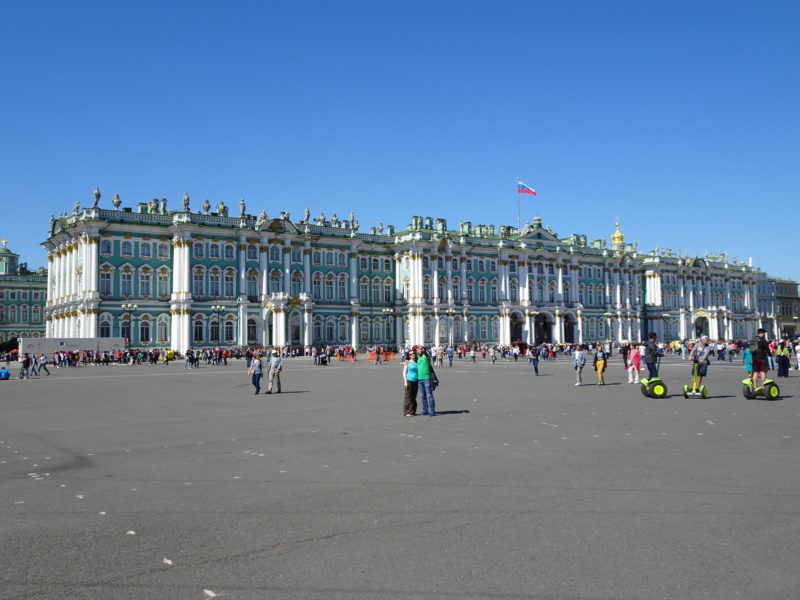
The Hermitage
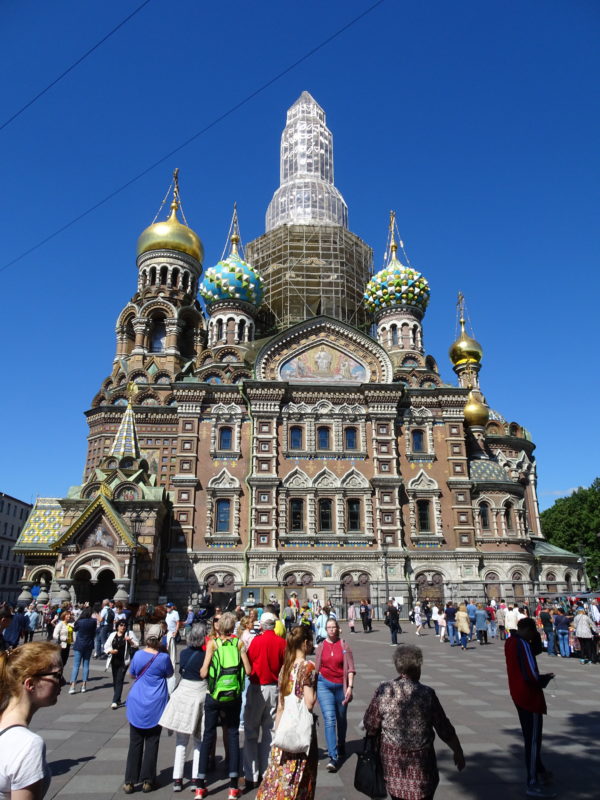
Savior on the Spilled Blood
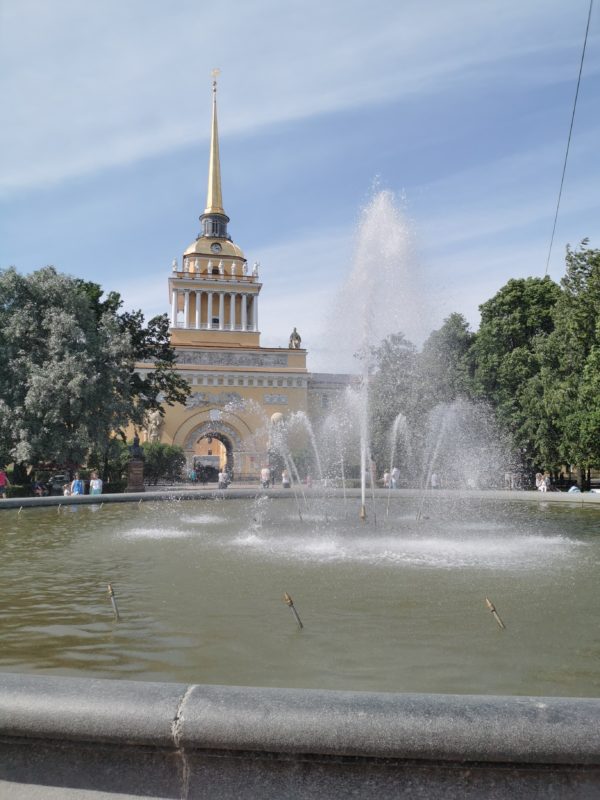
The Admiralty
I was very impressed with the beautiful city of St. Petersburg and I spent my first day in the city wandering its streets and across its bridges including visiting the Admiralty, the Bronze Horseman, St. Isaac’s Cathedral, the Alexander Garden, Palace Square, Savior on the Spilled Blood, and of course the Hermitage. Late in the afternoon, I made my way to the Otel’ Na Rimskogo-Korsakova, the 3-star property that I was to stay the next two nights.
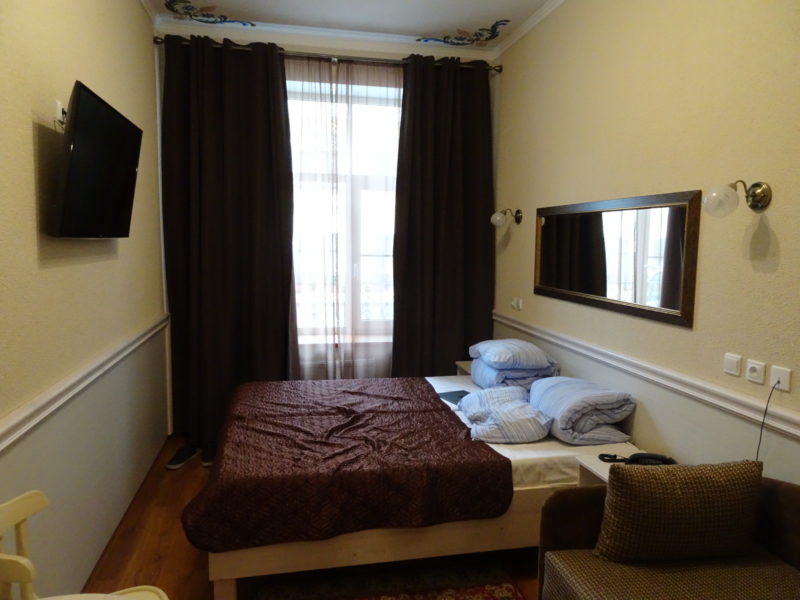
Room at Hotel Rimskogo-Korsakova
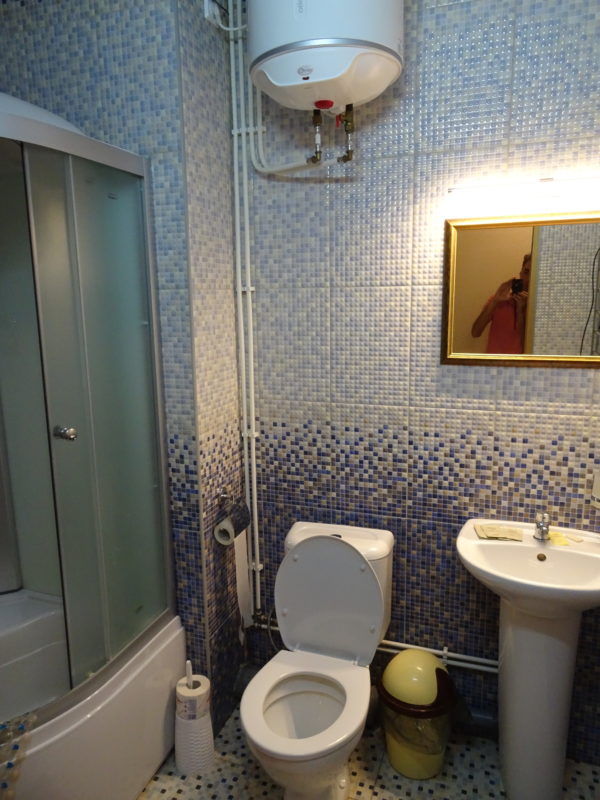
Bathroom at Hotel Rimskogo-Korsakova
Reception was not too friendly, and I had to pay a fee for the immigration registration, but I was nonetheless quickly checked in to my adequate room. Having slept poorly on the ship the previous night, I slept early and long, knowing the following night would be filled with aviation rather than sleep.
My second day in St. Petersburg was again mostly spent sightseeing with visits to Peter and Paul Fortress and other areas North of the Reka Neva. I enjoyed seeing the classic Russian hydrofoils speeding through the city’s waterways, though I didn’t have a chance to ride on one.
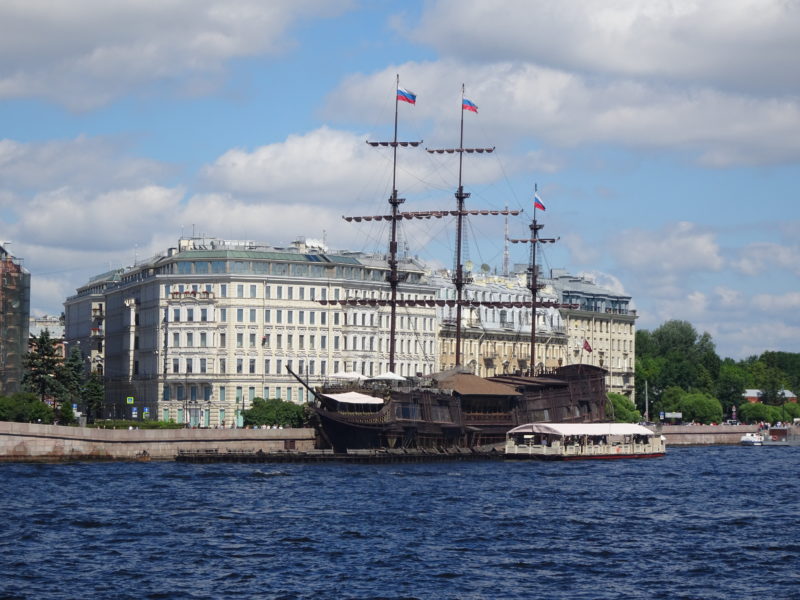
Restaurant boat on the Reka Neva
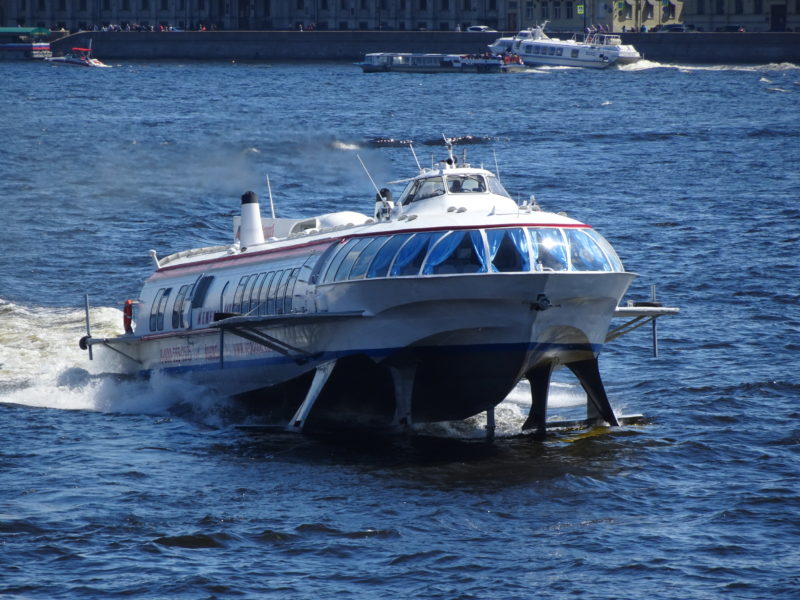
Hydrofoil ferry in St. Petersburg
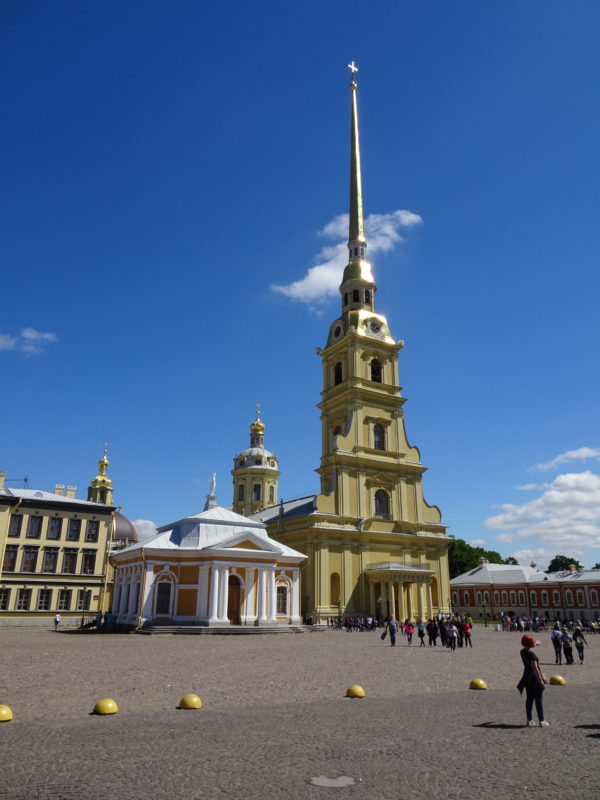
Peter and Paul Fortress
Moment of truth
In the afternoon, I prepped everything I needed for my Yak journey. I wanted as little human contact as possible during the trip as I was still concerned my visaless passport could raise eyebrows, so I made sure to do online check-in for both of my itineraries and use a self-printed boarding pass to avoid the check-in counters. This was surprisingly easy even for a somewhat obscure airline like Izhavia. While the Hotel Rimskogo-Korsakova had no printing facilities, I stopped by a nearby Holiday Inn that had a computer in the lobby which could be used for printing free of charge. With stories of needing to bribe airport officials still in my mind, I withdrew plenty of cash just in case.
Boarding passes in hand, I used Yandex taxi to go to Pulkovo Airport. For some reason, it wouldn’t accept any of my credit cards, but it was no problem to pay the driver in cash. At the airport, I went straight to security and handed over my passport and boarding pass. This was the moment of truth for whether foreigners’ visas would be checked on domestic journey and whether flying the Yak would be possible. The lady checked the photo page and matched the name on my paper boarding pass and swiftly handed back my documents. Phew! I passed the security check and relaxed in the terminal while tracking the inbound aircraft.
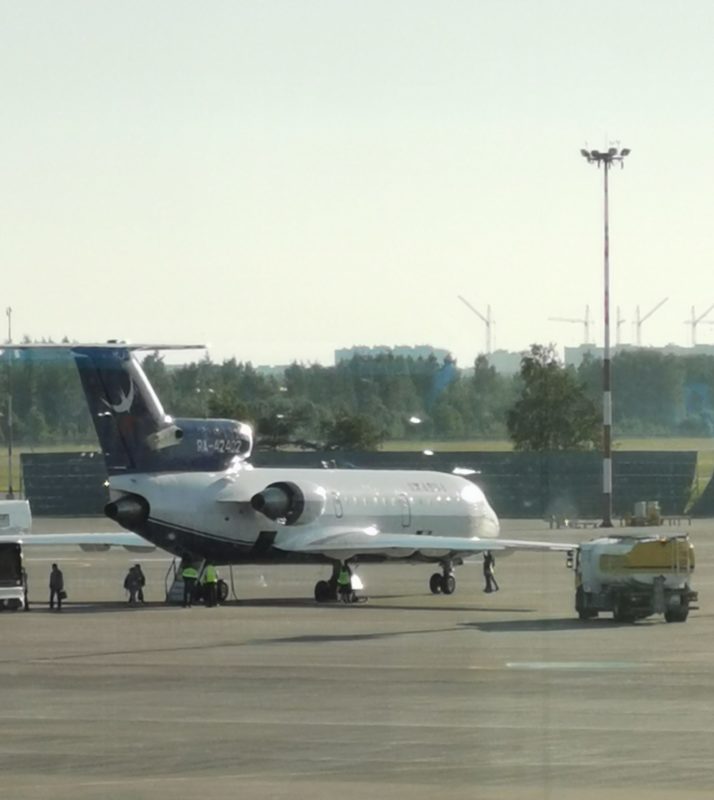
The aircraft viewed from the terminal window
It was easy enough to find the departure gate once boarding time rolled around as the FIDS clearly listed the boarding gates for all flights, unlike the bad experience from Vnukovo I had read about. Boarding passes were scanned, and everyone proceeded downstairs to the bus. We were driven a short way to a remote stand then boarded in true Yakovlev style – through the internal airstairs!
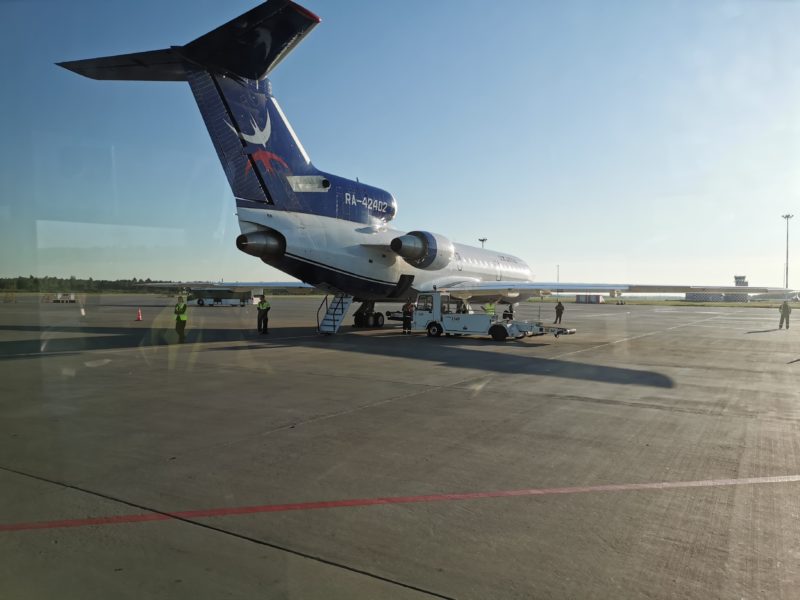
Izhavia Yak-42 viewed from the bus
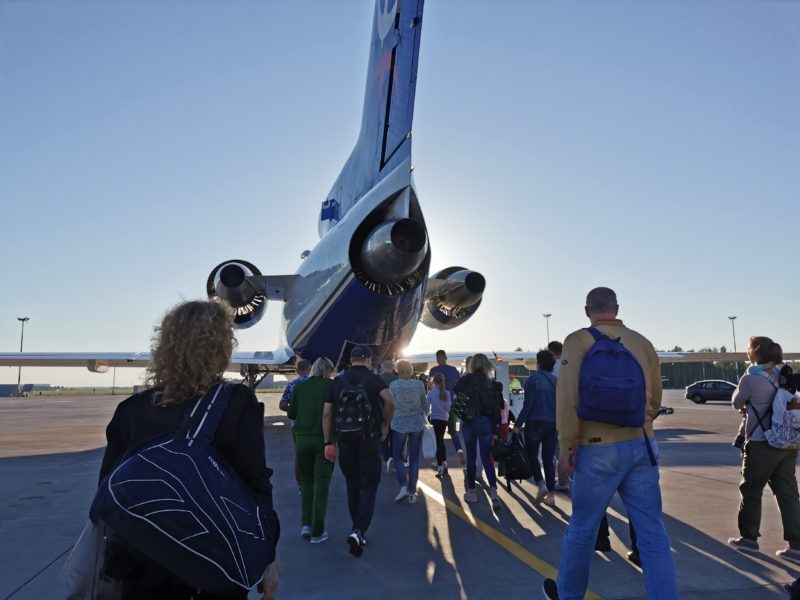
Boarding the Yakovlev tri-jet
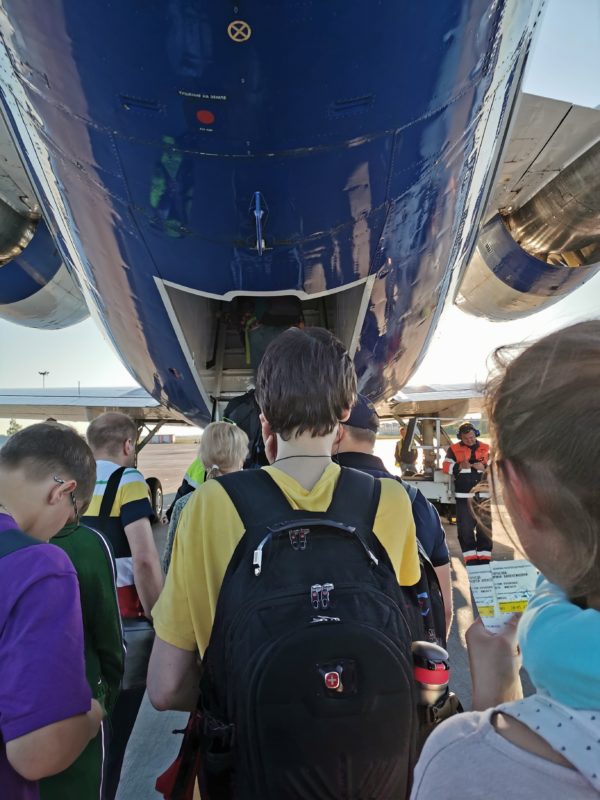
Boarding via integral airstairs
While the Yak-40 and 42 share an external resemblance, the larger sibling really is a different animal. Inside, the Yak-42 feels much more like a mainline jet with its six-abreast seating, whereas the 40’s smaller cabin and four-abreast seating feels more like a regional jet.
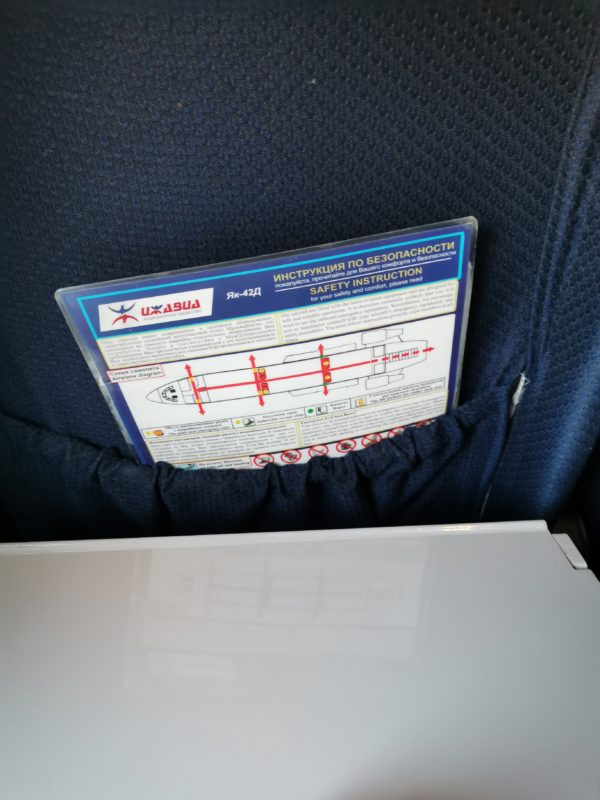
Yak-42 safety card
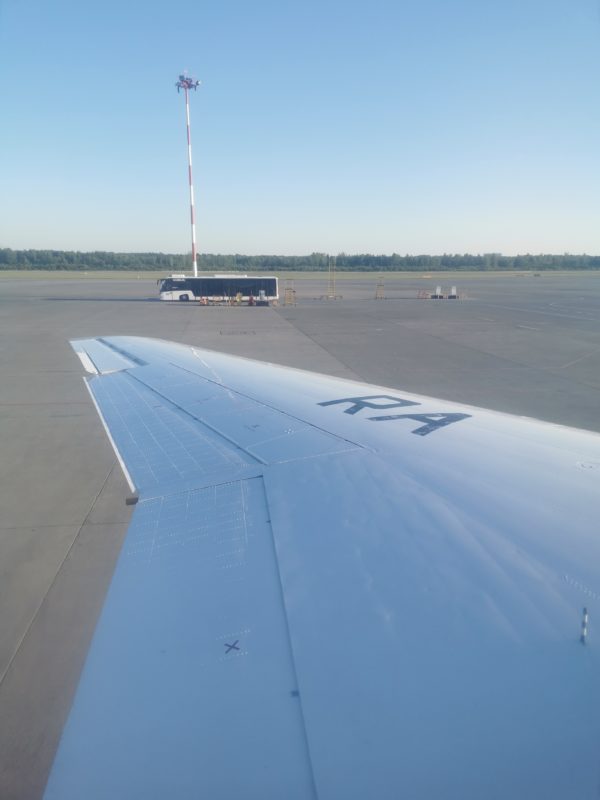
Seated at the trailing edge of the wing
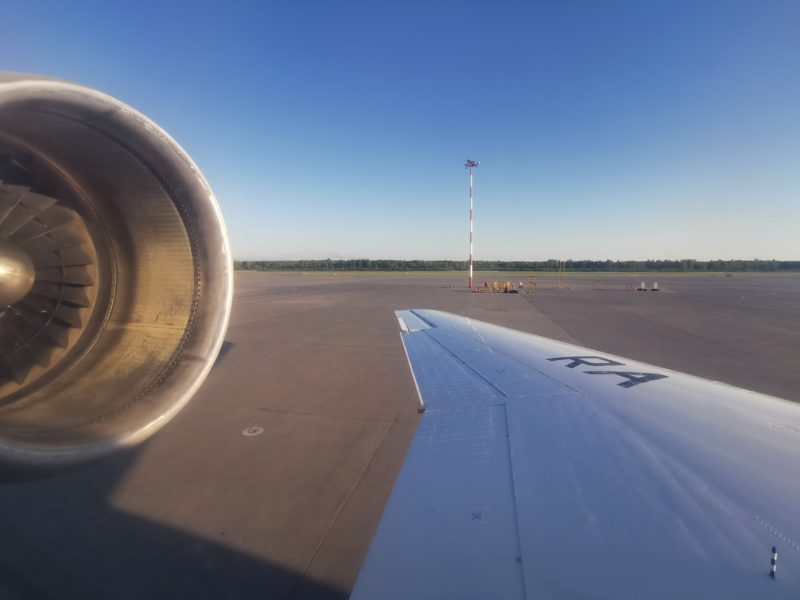
Window seat on the Yak-42
I settled into my window seat in the second to last row and was joined by a Russian couple occupying the other two seats. After boarding completed, a safety demo was conducted and the engines were started at which point I was reminded why avgeeks choose seats by the engines.
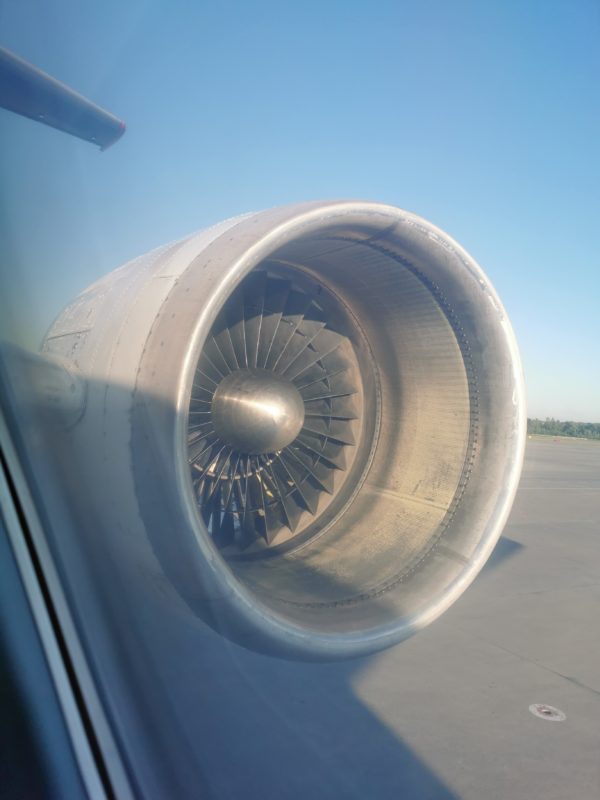
Engine view seat
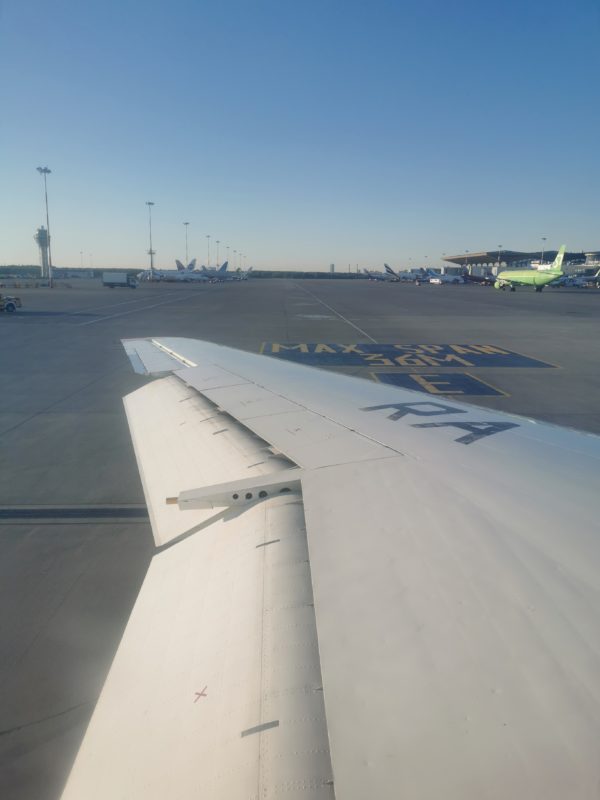
Taxiing at Pulkovo Airport
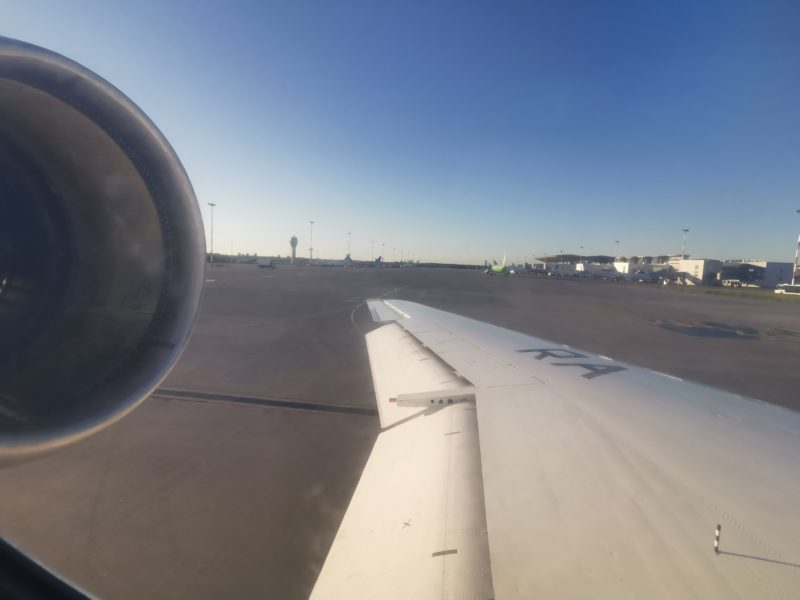
Taxiing at Pulkovo Airport
After a short taxi to Runway 28L, we started our takeoff roll. I was eager to hear the famous “buzzsaw” sound that other enthusiasts have described on their Yak-42 flights, but while the engines do have a truly unique sound, I couldn’t identify what part would be similar to a buzzsaw. Nonetheless, I was very happy to be flying aboard this Russian machine.
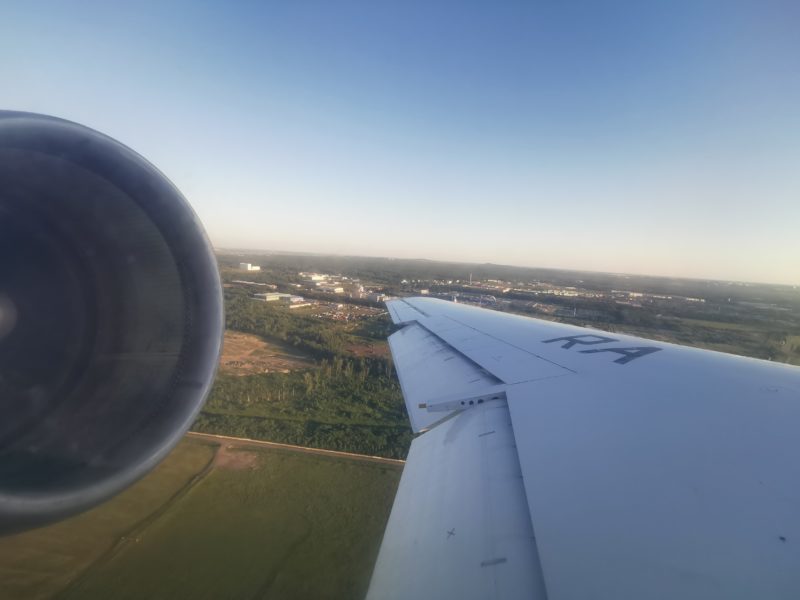
Taking off from Pulkovo Airport
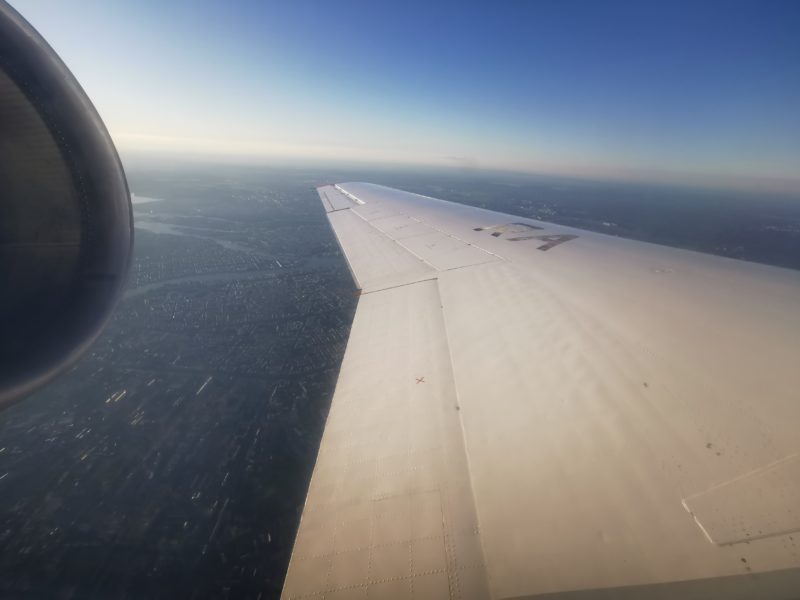
Flying above St. Petersburg
Thanks to the trip being during the white nights part of the year, there was still plenty to see outside the window for the first half of the two-hour journey, despite taking off at 8:50 pm. A meal was served and I couldn’t communicate which of the options I wanted, so I pointed to what my seat neighbour had selected. At this point my two seatmates looked at me in a way that seemed surprised I couldn’t speak Russian. I had figured out what chai means, so ordering some tea was no problem. As it became darker outside, I passed the time by reading a book and just enjoying the ambiance of the flight.
We began our approach to Izhevsk as the last rays of sunlight disappeared from the sky and touched down on Runway 01 three minutes ahead of schedule. After backtracking on the runway and a short taxi, we parked alongside other Izhavia Yak-42s in a variety of paint schemes. We deplaned, again using the rear airstairs and proceeded into the terminal.
Making a quick return
After walking out of the baggage claim area and into the departure hall, I found a seating area and continued to read among other early passengers waiting for the security check to open. After about an hour and a half of waiting, security staff arrived and opened the checkpoint. The document check staff again took a look at my passport photo page and self-printed Aeroflot boarding pass and let me proceed without issue.
There were few amenities in the departure area of Izhevsk Airport, but there was one good vending machine full of Izhevsk souvenirs that could be purchased by credit card. Unfortunately, when trying to buy magnets from the machine, they were dispensed and began to fall to the bottom of the machine for collection but would instead immediately become stuck on the metal frame inside the machine.
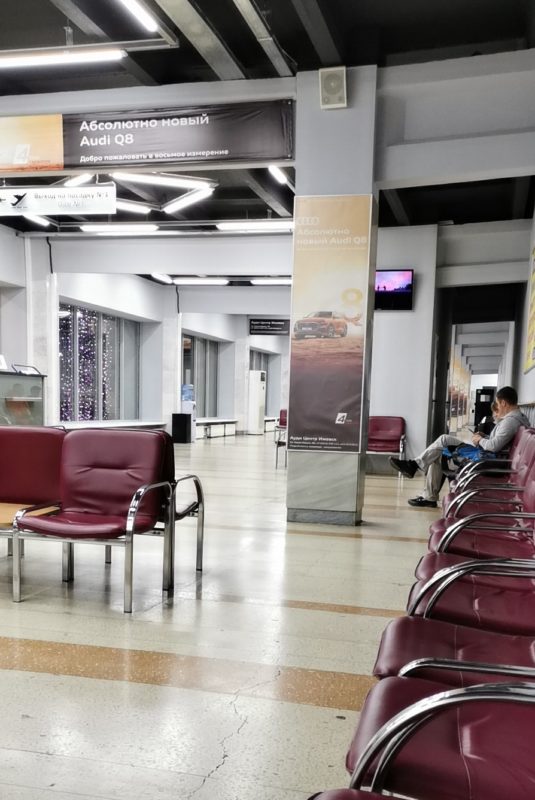
Departures area at Izhevsk Airport
Eventually, ground staff manned the gate podium, the SSJ arrived from Moscow, and boarding commenced. After my boarding pass was scanned, the system made an alert beeping and the agent asked for my passport. Just another cursory check and I was on my way. We were bussed to the aircraft and boarded just as the first rays of sunlight were coming over the horizon – it had been a very short night!
The 1.5-hour Aeroflot flight to Moscow was uneventful, though with good service. A decent meal was served, but with no choice of options. After landing at Sheremetyevo and being bussed to the terminal, I passed a quick transit security check and spent about an hour in a Priority Pass lounge before the next flight.
The flight to St. Petersburg on a different SSJ was very similar to the one from Izhevsk. Good service with a single meal option provided during the hour-long flight. Back at Pulkovo Airport, we disembarked via jetbridge and I took another Yandex taxi back to the Hotel Rimskogo-Korsakova arriving around 8:30 am – about 14 hours since my adventure had begun. With time remaining before check-out, I finally got a bit of sleep.
After checking out of the hotel, I spent my final day in St. Petersburg, walking around New Holland Island and Alexander Garden before catching the shuttle bus to the port from where it had dropped me off.
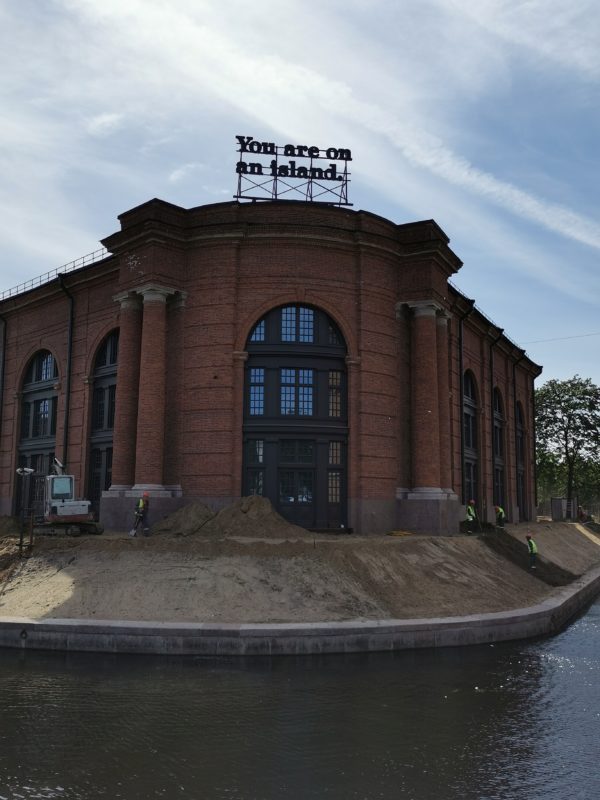
New Holland Island
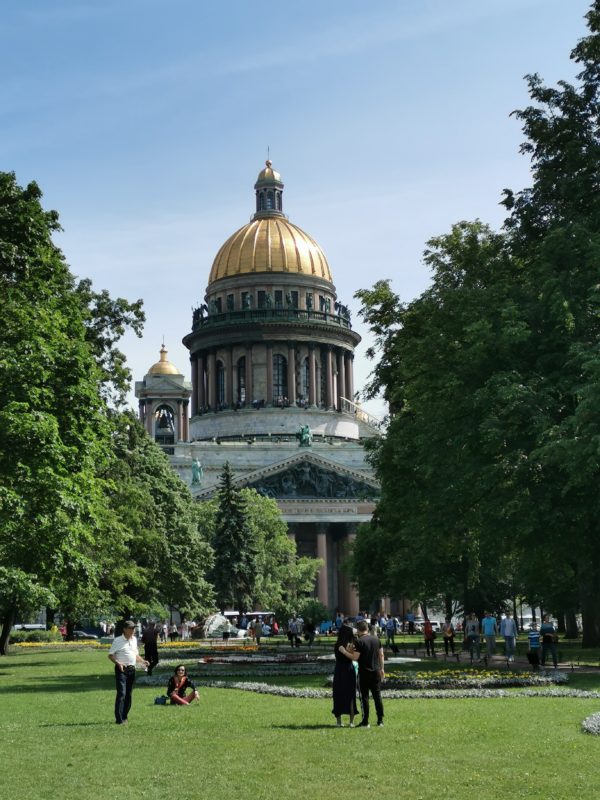
Alexander Garden
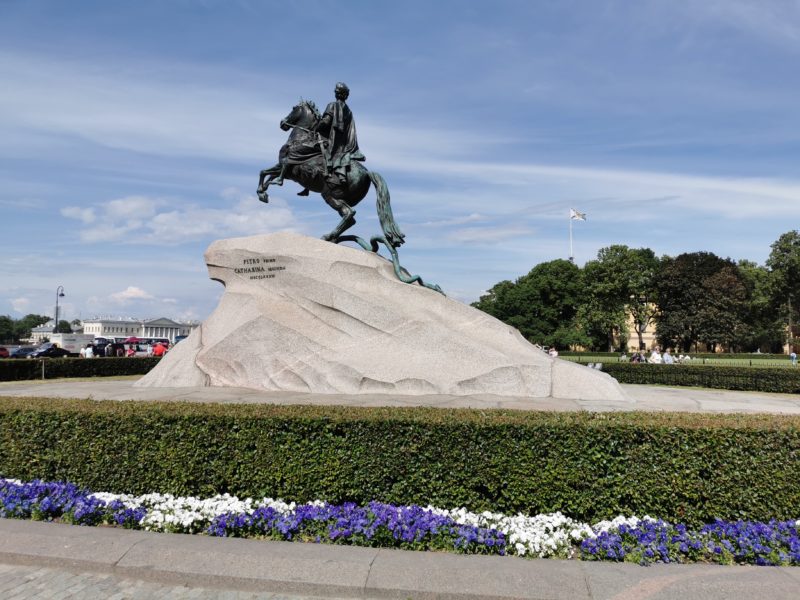
The Bronze Horseman
Back to the EU
The check in for the ferry was madness this time with long intertwining lines leading to the ticketing counters and immigration check. The number of people in the small space was incredible. I had seen some fellow passengers when I arrived who were due to go back to Helsinki the same day; doing that, I can’t imagine having enough time to see anything in the city considering how long the formalities in each direction took.
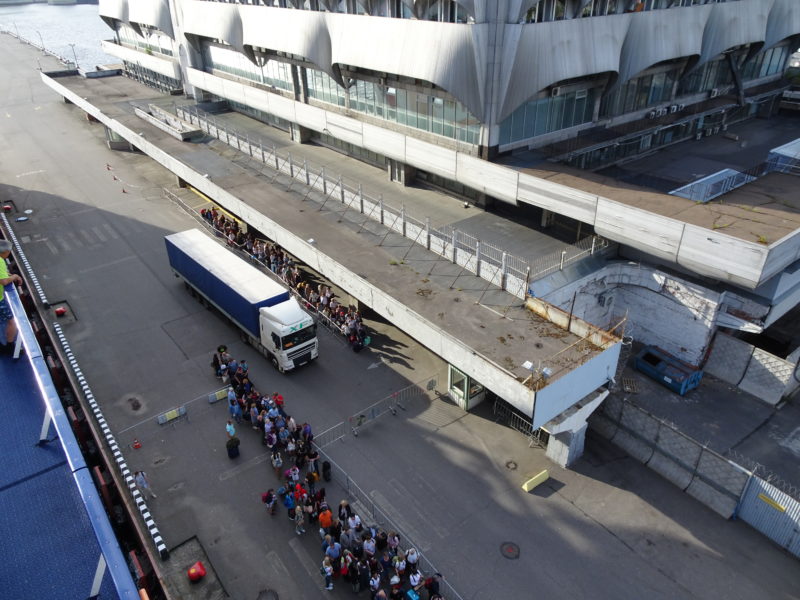
Queue to board the Princess Anastasia
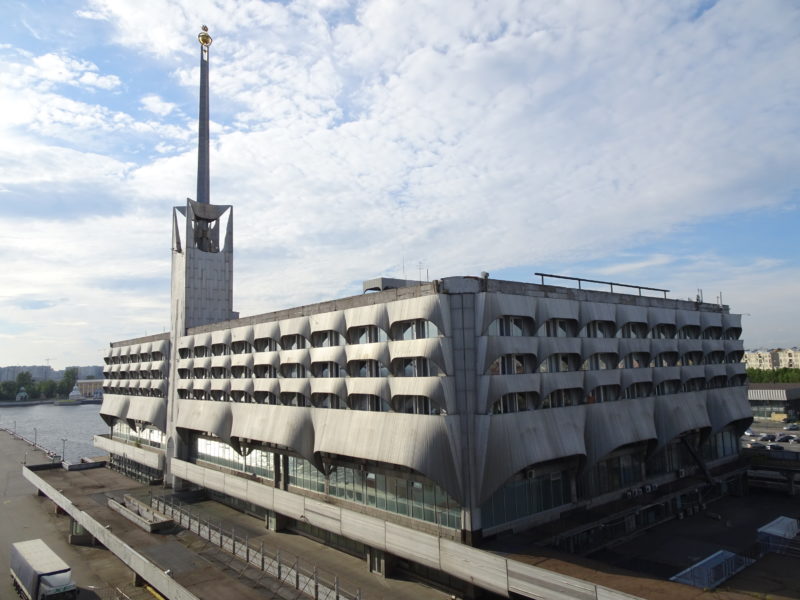
St. Petersburg Ferry Terminal
After a couple of hours in line, I could finally board the ship and found my stateroom, very similar to the first. The views sailing out of St. Petersburg and into the Gulf of Finland were great as we passed other cargo vessels, bridges, and industrial areas before getting out into open water. I had a simple dinner on the ship, spending the last of my rubles.
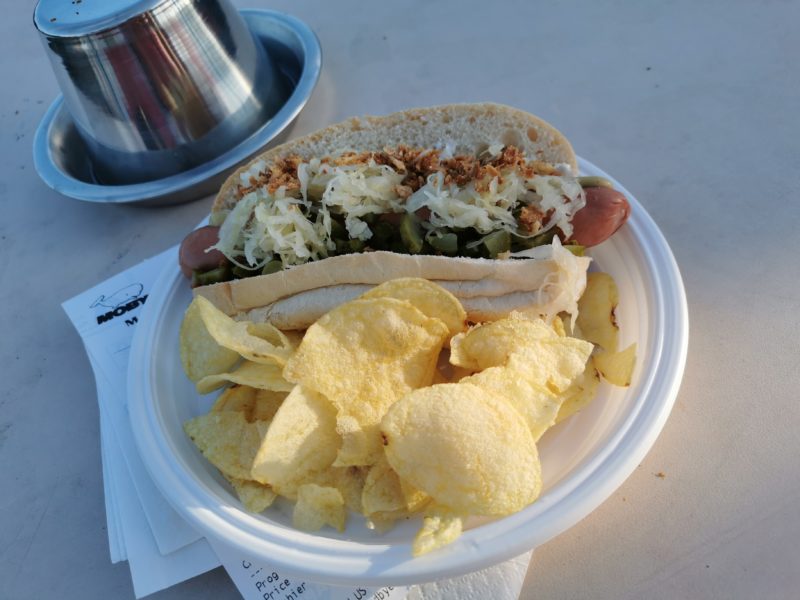
Meal from the ferry’s outdoor dining area
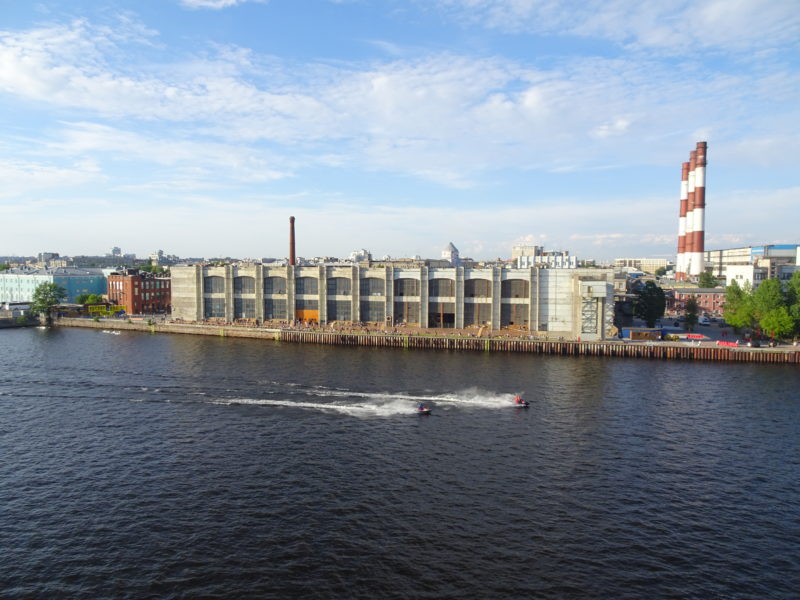
St. Petersburg waterfront area
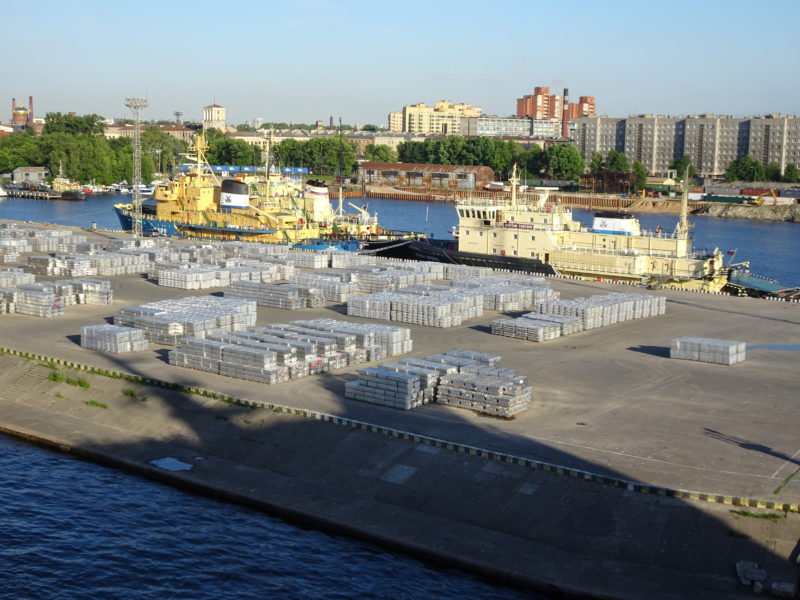
St. Petersburg industrial area
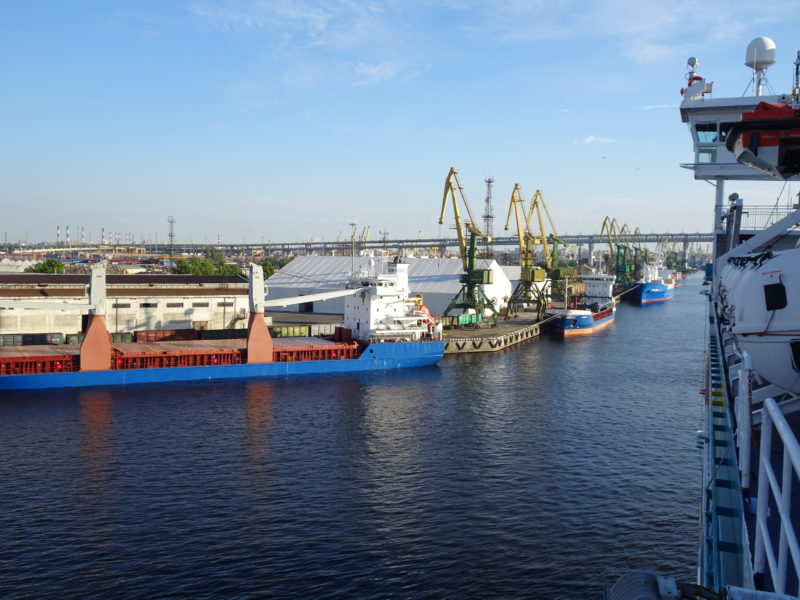
View of ships while sailing out of St. Petersburg
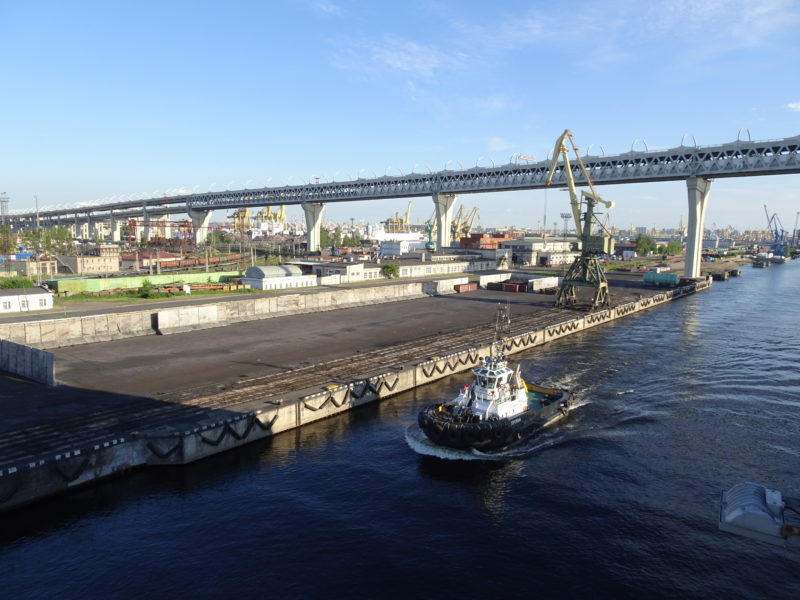
Tugboat passing the ferry
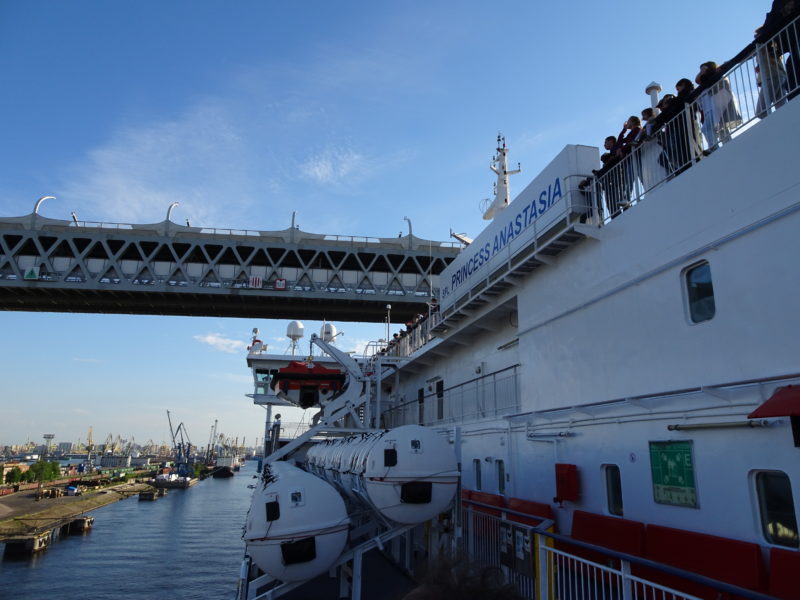
Princess Anastasia passing under bridge
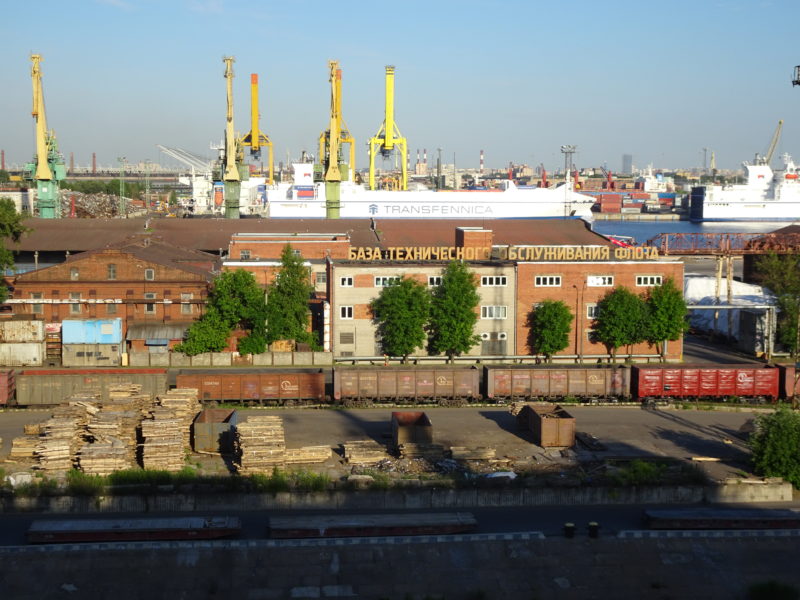
Port areas viewed from the ferry
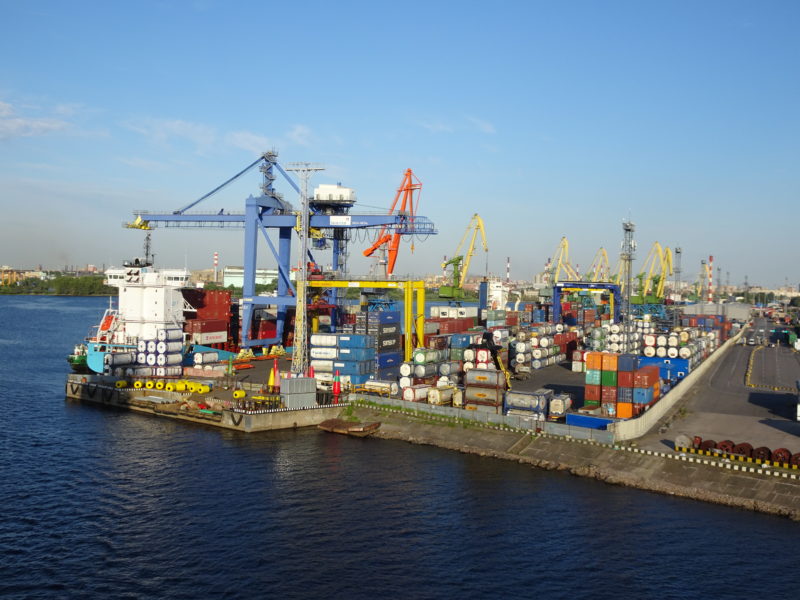
Container port seen leaving St. Petersburg
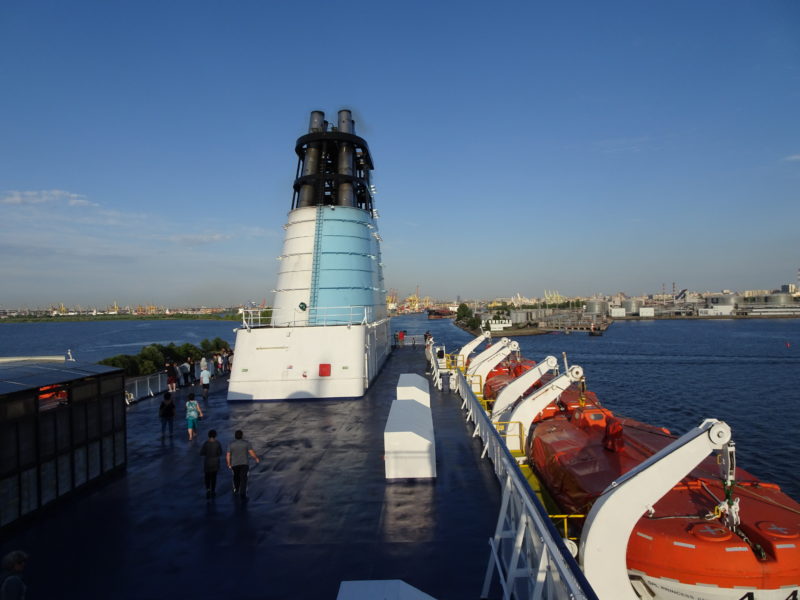
Top deck of the Princess Anastasia
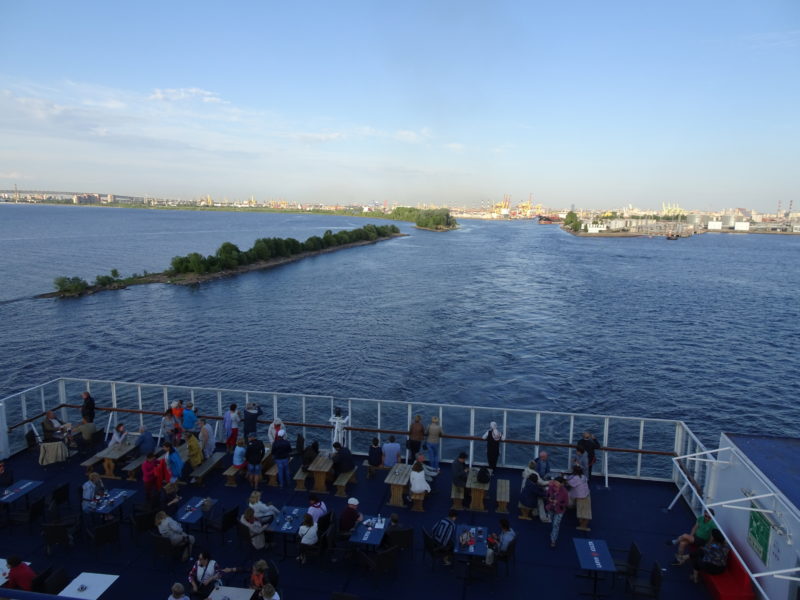
Princess Anastasia’s outdoor dining area
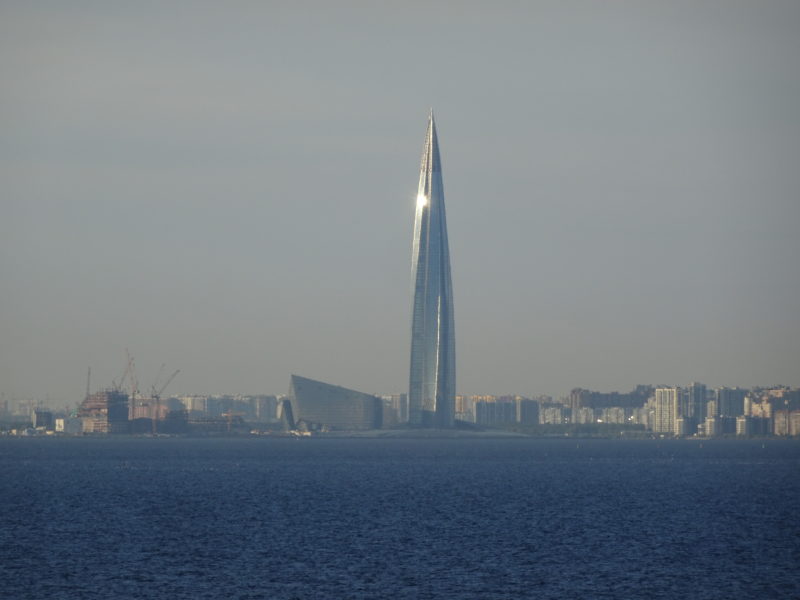
Lakhta Center
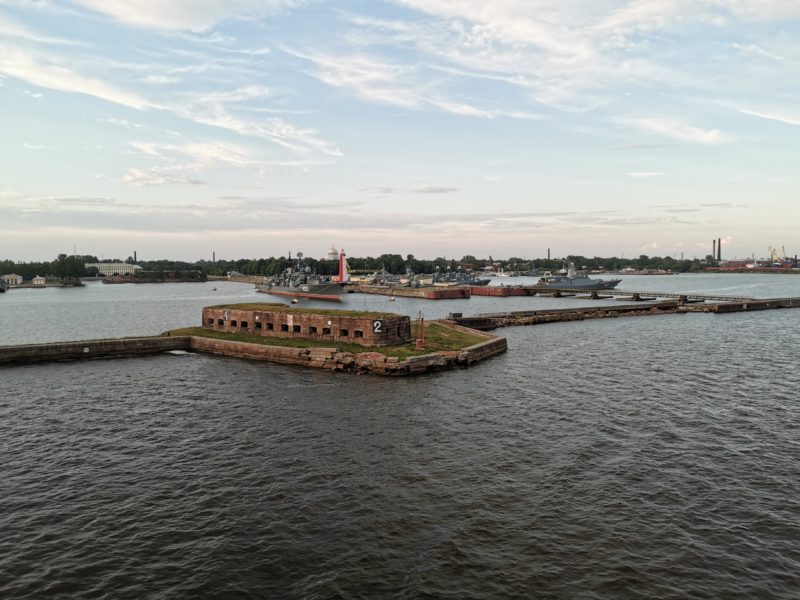
Leaving Russian waters
Tallinn, Estonia
I slept well after the previous day’s long night of flying and awoke just as we were pulling in to Tallin’s large cruise and ferry terminal. Immigration lines were again long but moved quickly since many passengers had EU passports for which processing time was very fast.
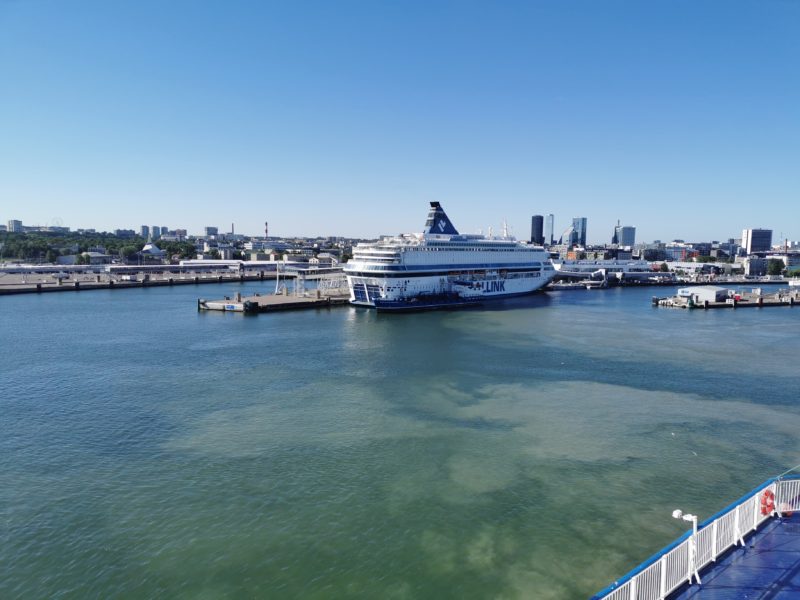
Tallink Ferry in Tallinn
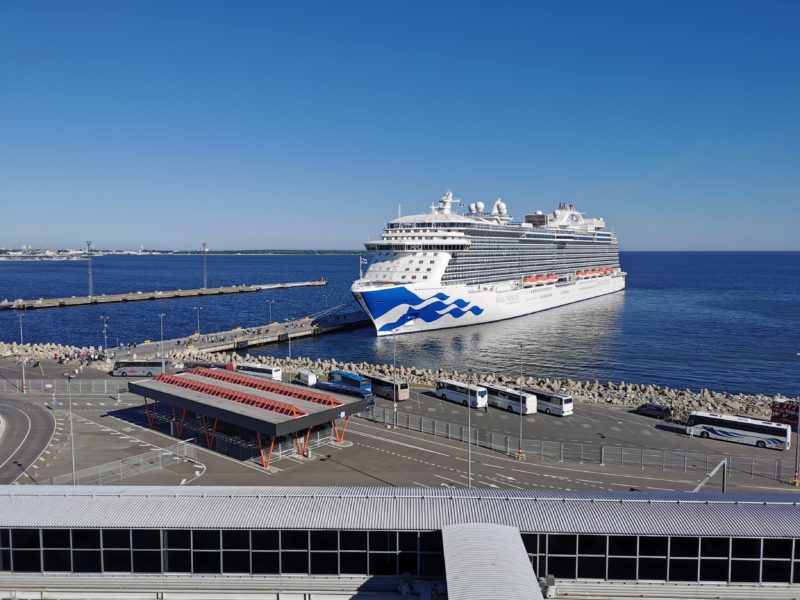
Princess Cruises cruise ship (unrelated to Princess Anastasia)
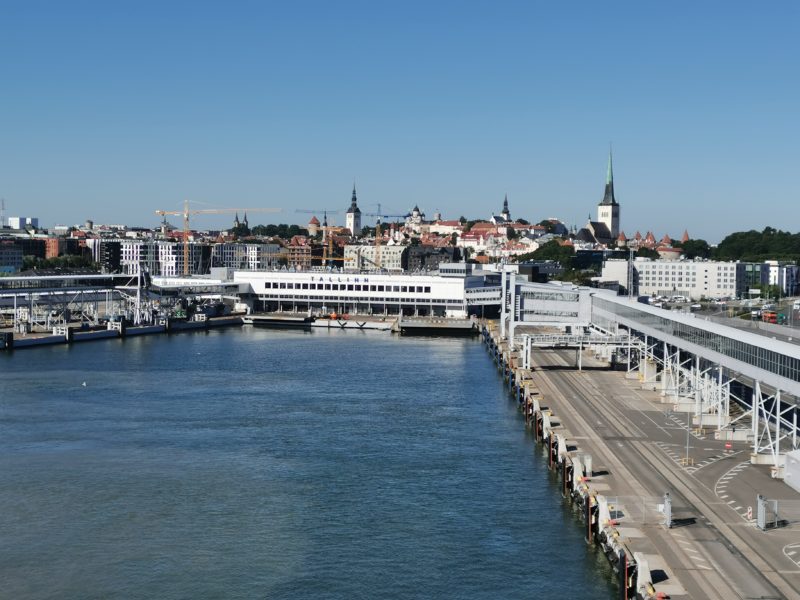
Tallinn Passenger Port
I was welcomed to Estonia for the first time by the friendly border guard and walked into town. I enjoyed strolling through the streets of the small city and ate a light meal at a very quiet restaurant near Toompea Ioss.
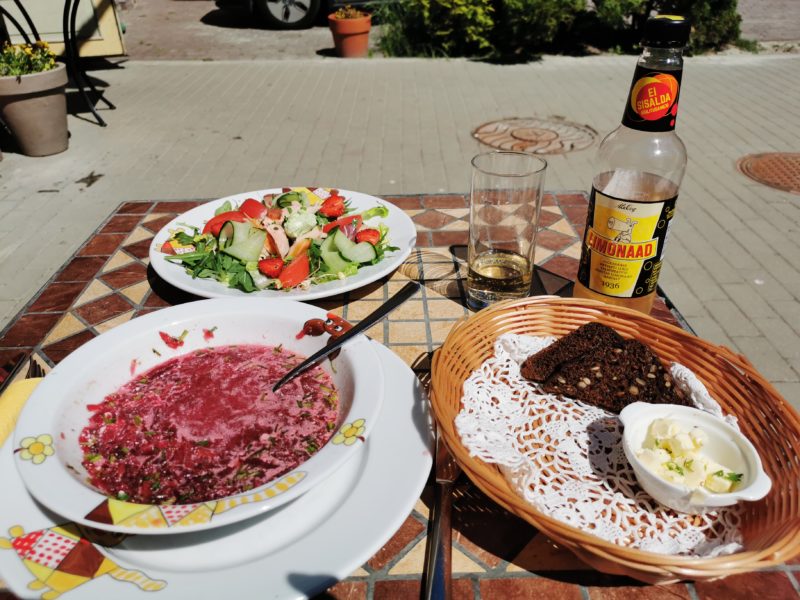
Light lunch in Tallinn
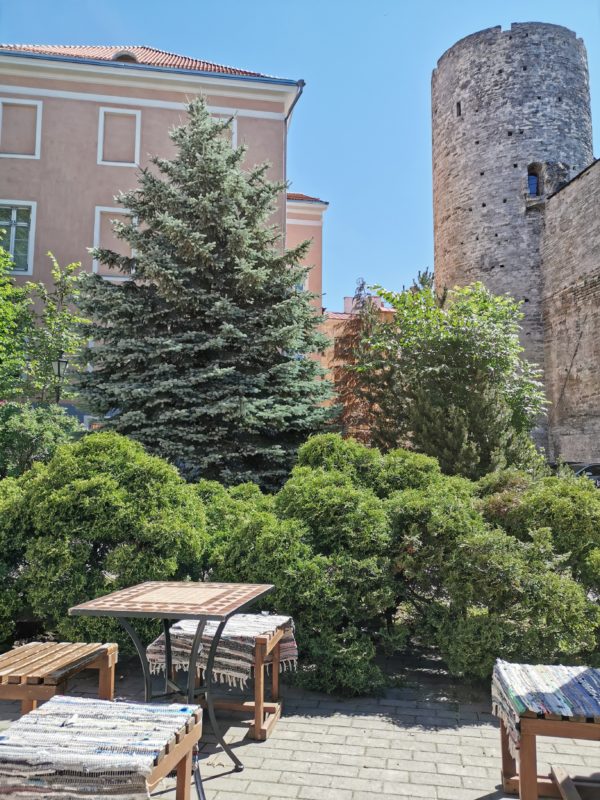
Toompea Ioss in Tallinn
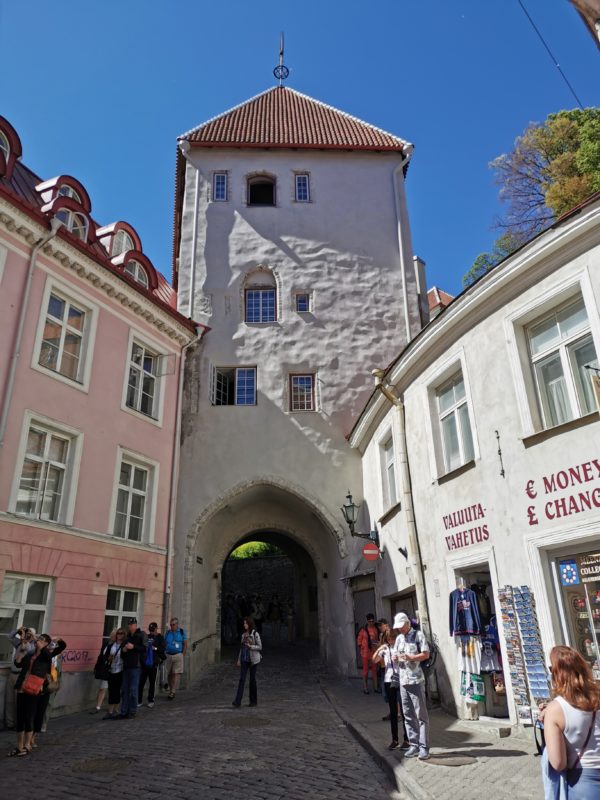
Archway in Tallinn
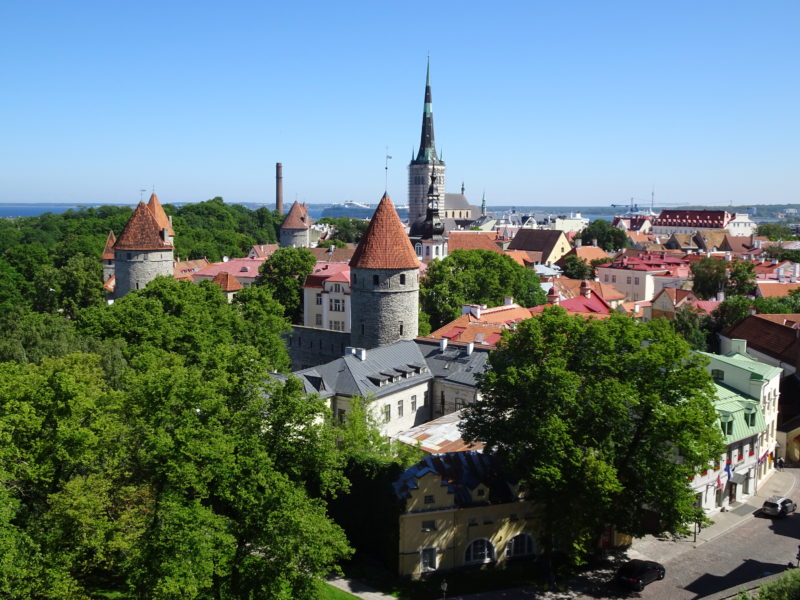
Tallinn Skyline
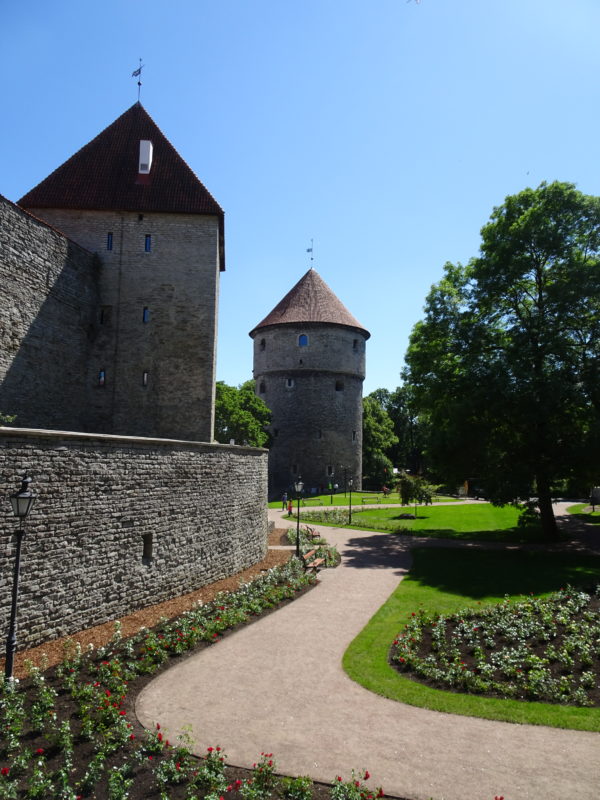
Sightseeing in Tallinn
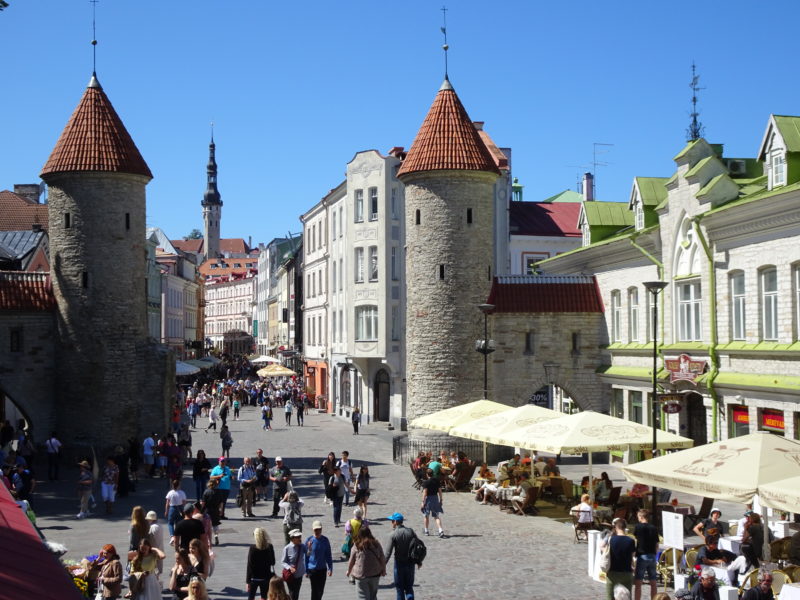
Pedestrian street in Tallinn
Vilnius, Lithuania
After a few more hours of exploring the city, I took the tram to the airport for my Nordica flight to Vilnius, where I would spend the night. The ATR 72 flight operated by Regional Jet was uneventful, but I found the Tallinn Airport’s terminal to be homey and comfortable while waiting for departure.
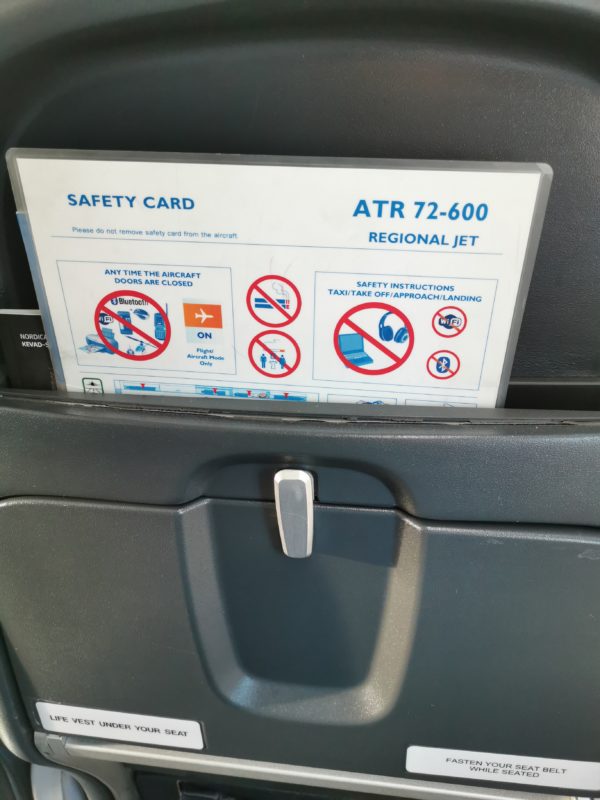
Nordica ATR72 Safety Card
At Vilnius, my arrival aligned well with the train service to the city’s main railway station, so I decided to wait on the small platform for about ten minutes and catch the train. Tickets are purchased from the conductor onboard with cash and were very affordable for the short ride.
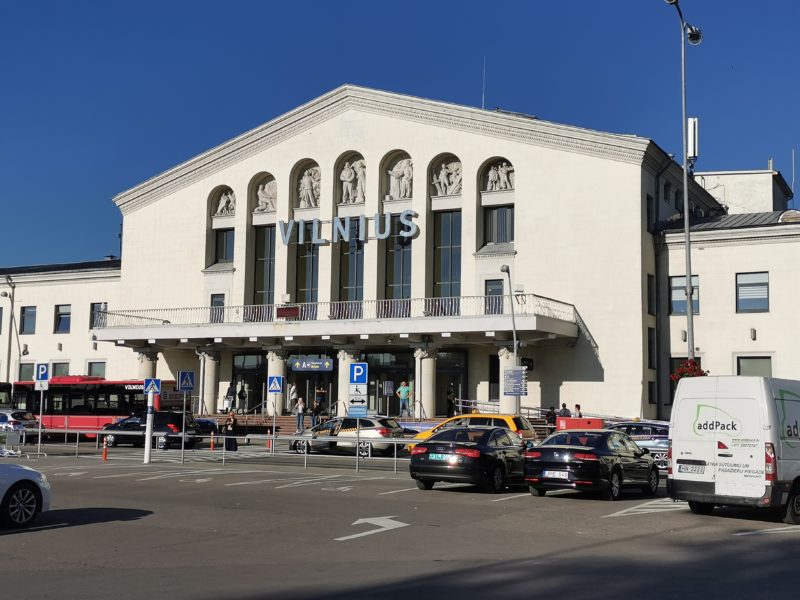
Vilnius Airport Terminal
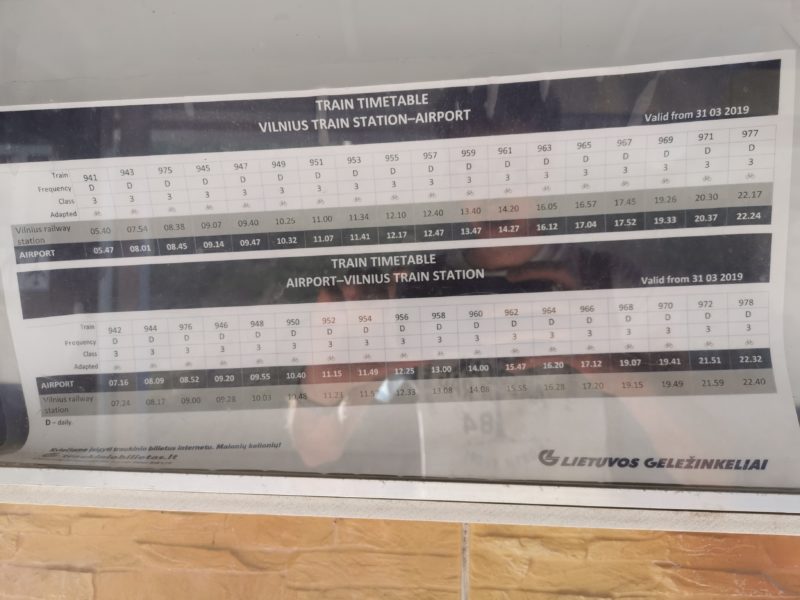
Train Schedule at Vilnius Airport Railway Station
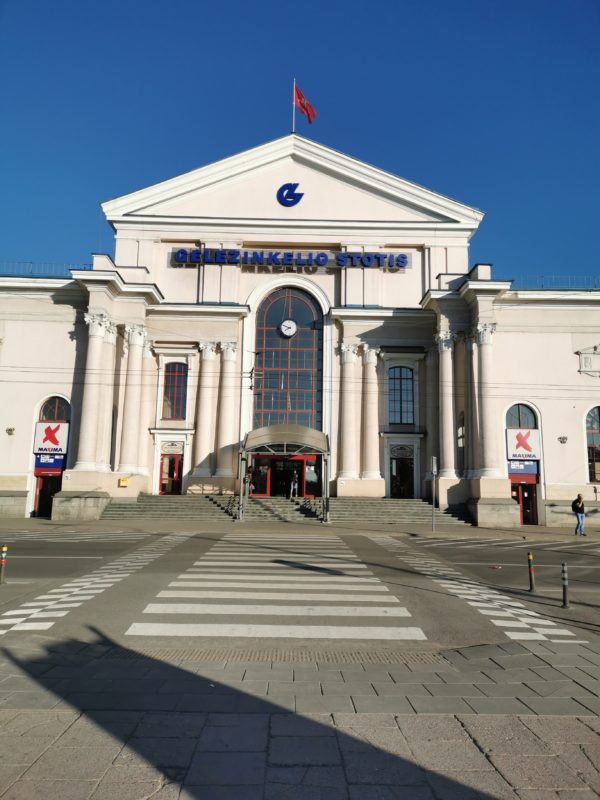
Vilnius Train Station
I stayed in a hotel across from the station and spent the next day exploring Lithuania’s capital before returning to the airport by train to catch my Ryanair flight to London-Stansted. While Ryanair flights are among the most boring out there from an aviation enthusiast’s perspective, one redeeming factor that day was that the flight was operated by Ryanair UK, which at that pre-Brexit time had just one aircraft (G-RUKA) on its certificate.
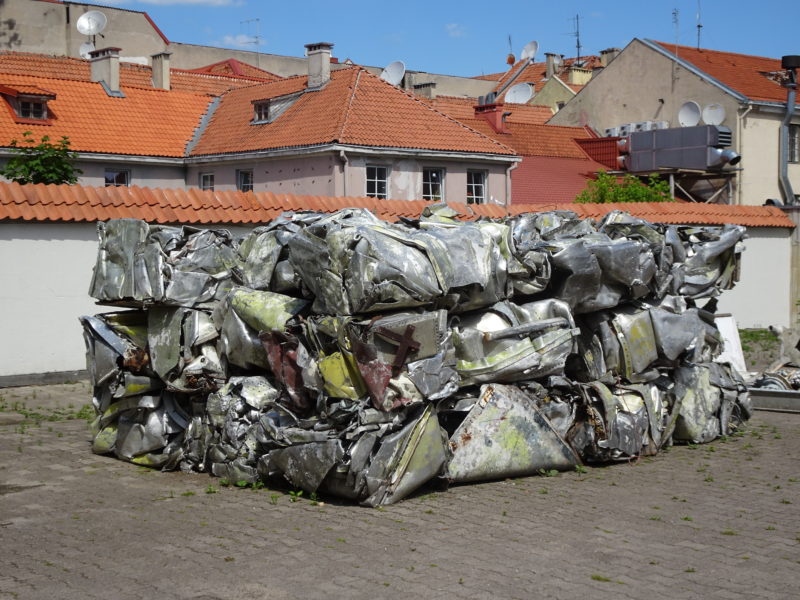
Metal sculpture in modern art garden
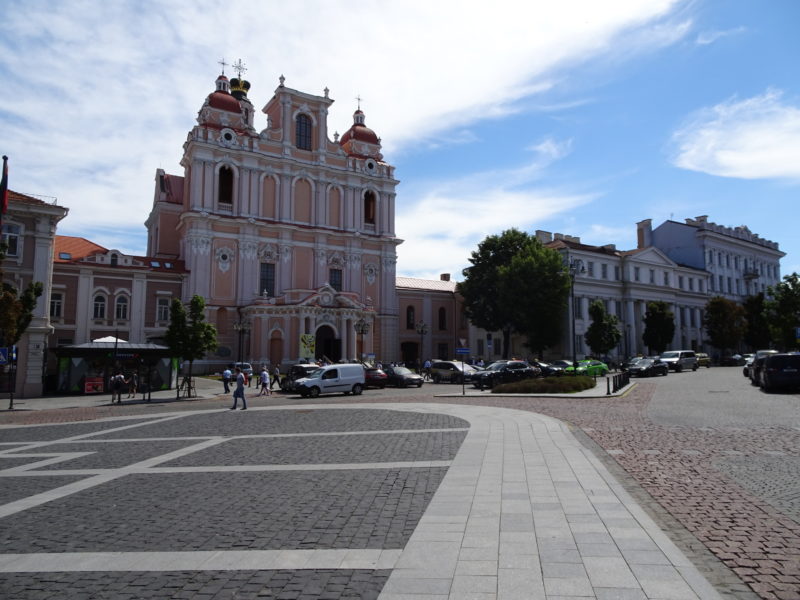
Square in Vilnius
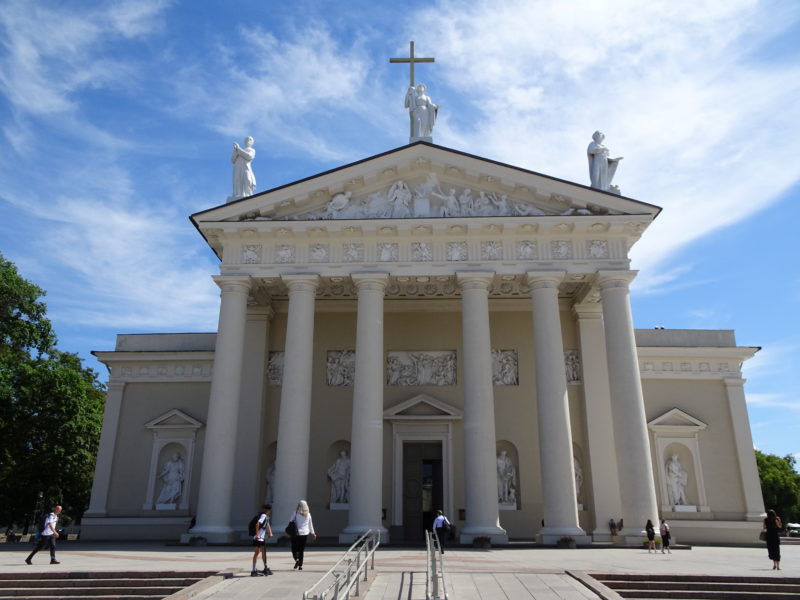
Vilnius sightseeing
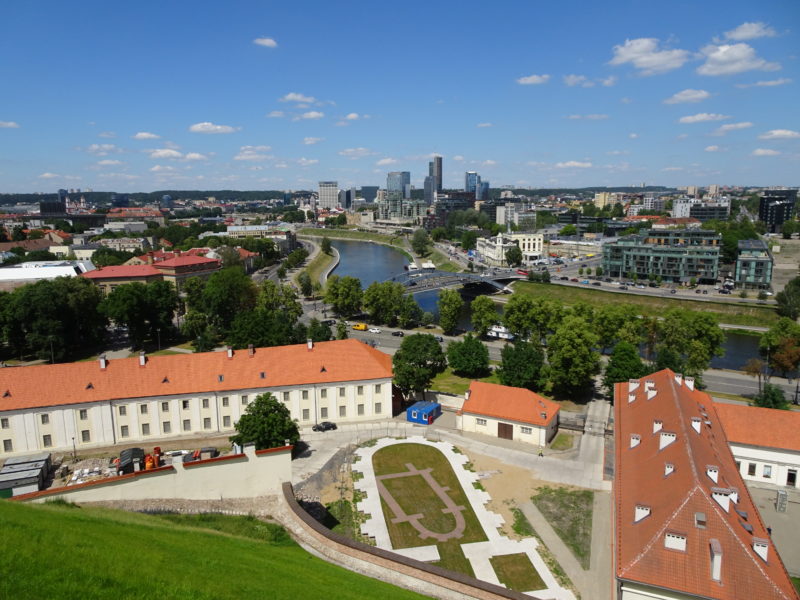
Vilnius Skyline
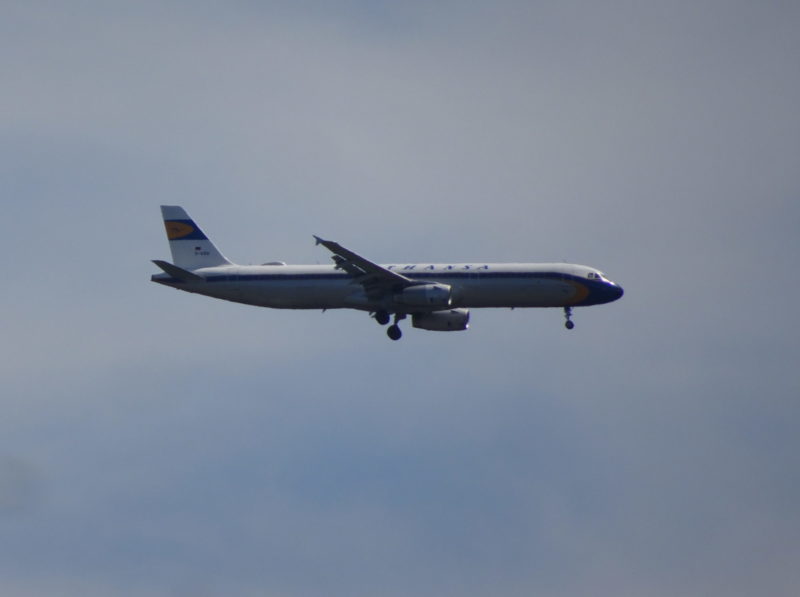
Spotting a special livery Lufthansa A321 in Vilnius
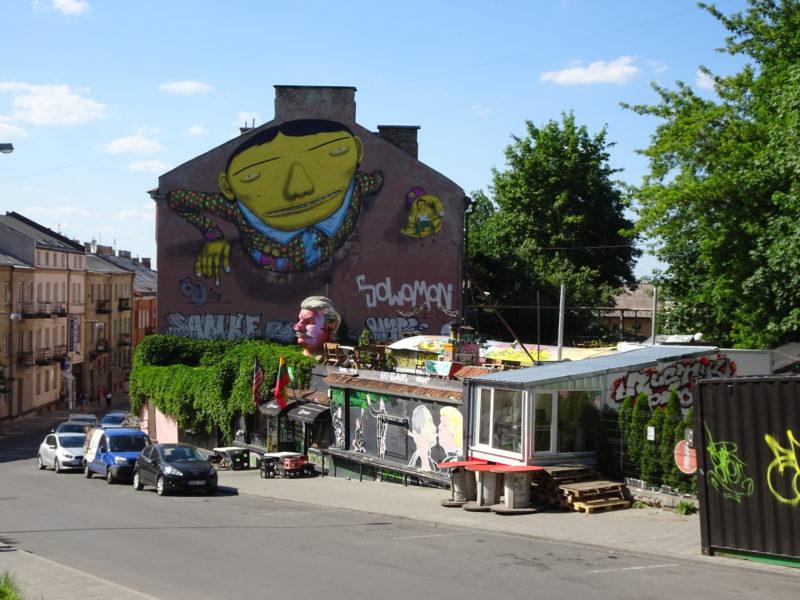
Street art mural in Vilnius
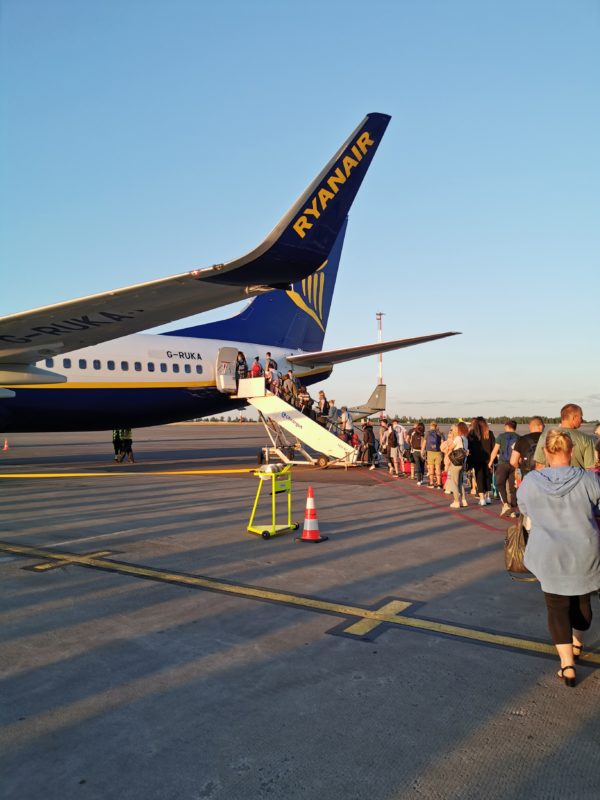
Boarding the Ryanair UK flight to Stansted
All in all, it was a very worthwhile, if at times worry-inducing, trip to catch an increasingly rare Russian jet and enjoy summertime in some beautiful Eastern European cities. I’m pleased to not have needed to get a Russian visa for this trip and all the more pleased that my lack of a Russian visa did not get me into any trouble as some pessimists had suggested.
